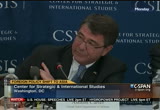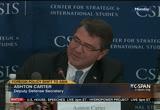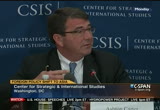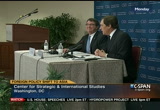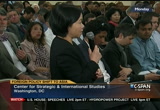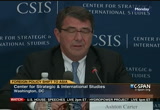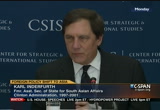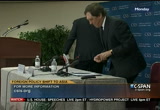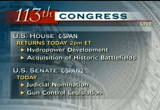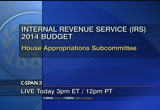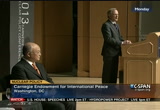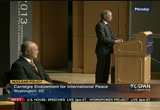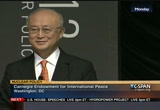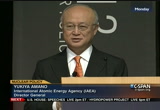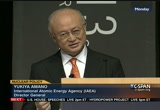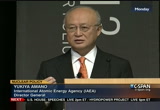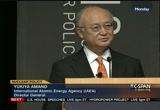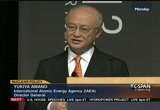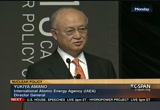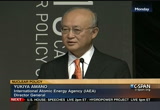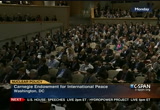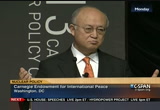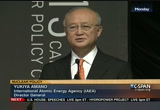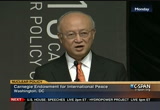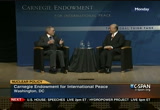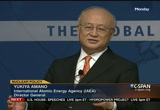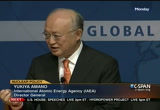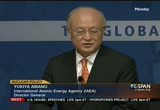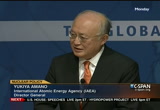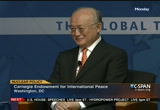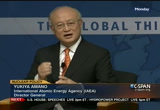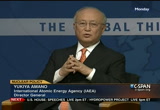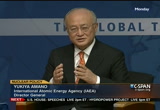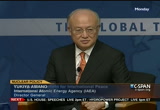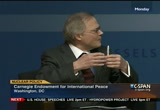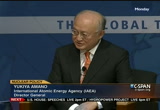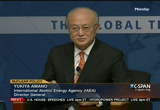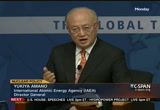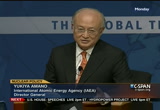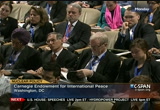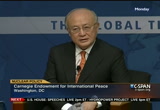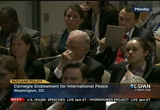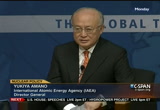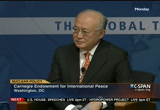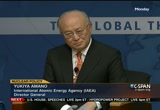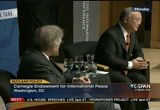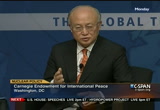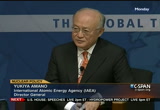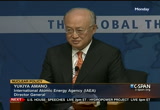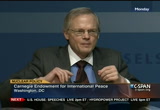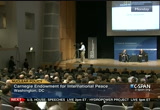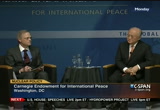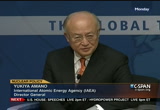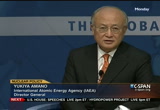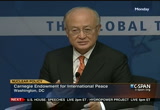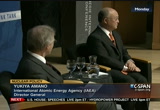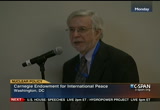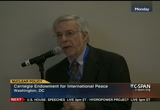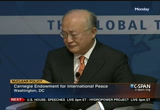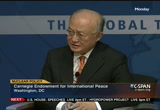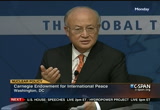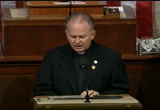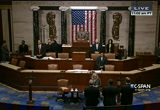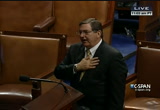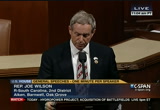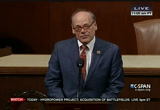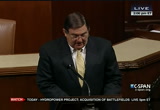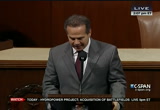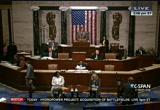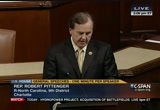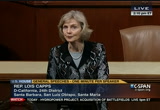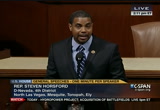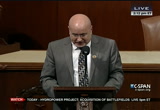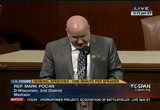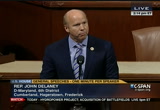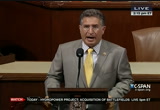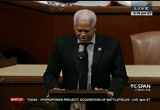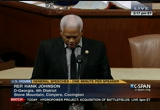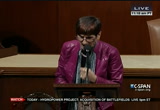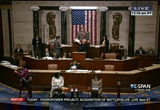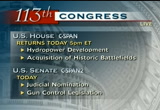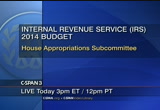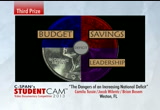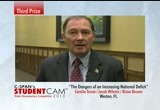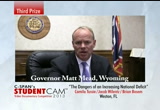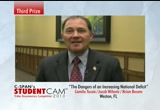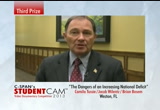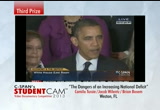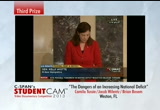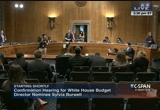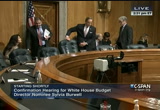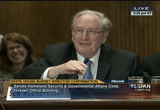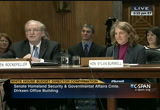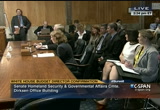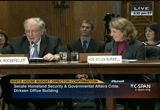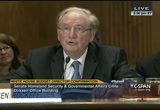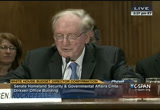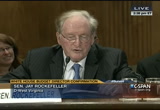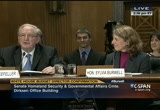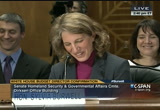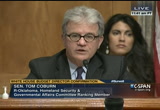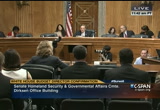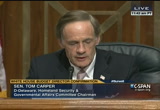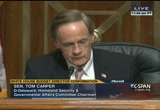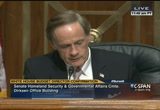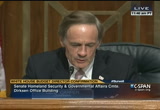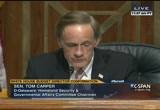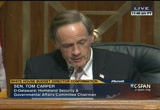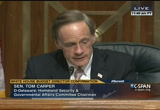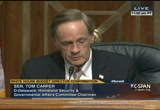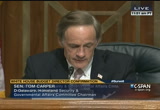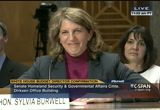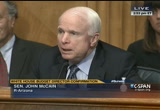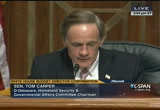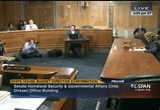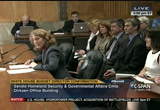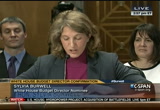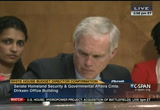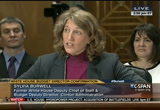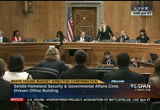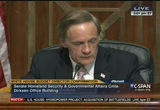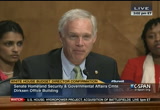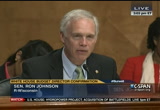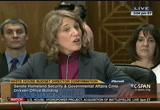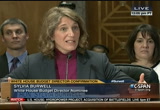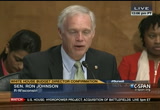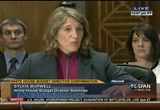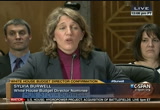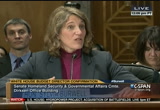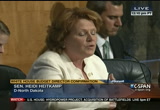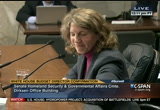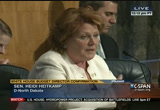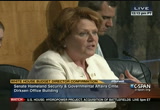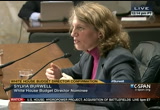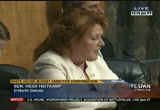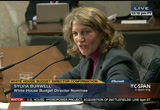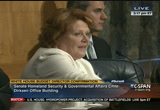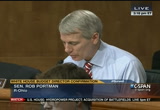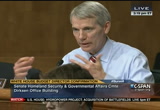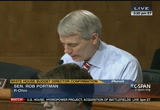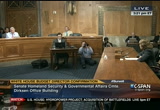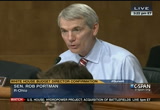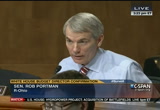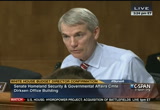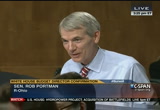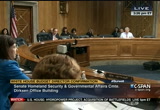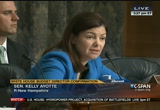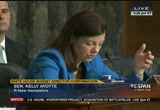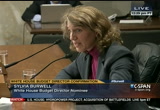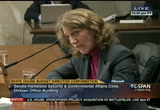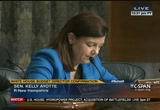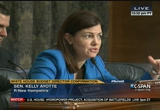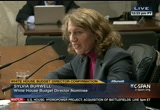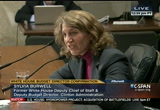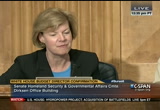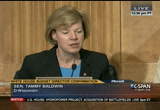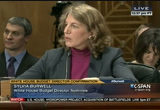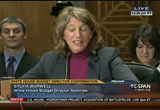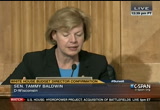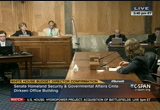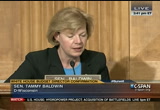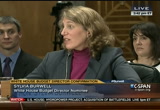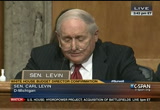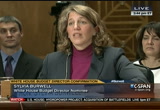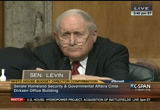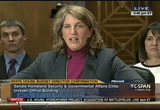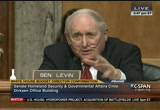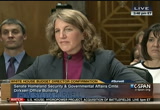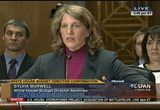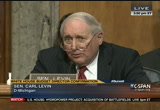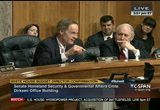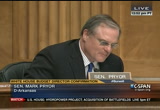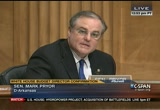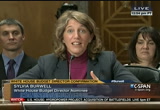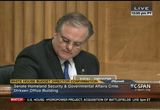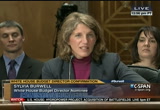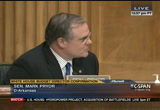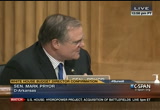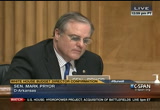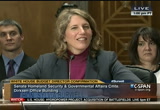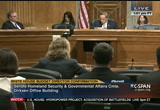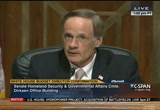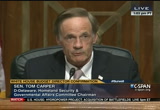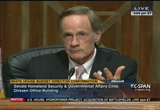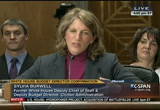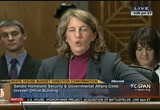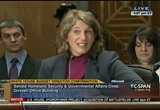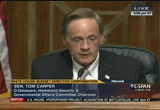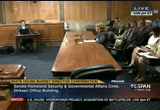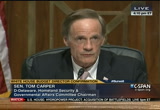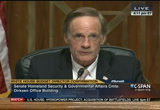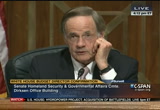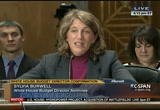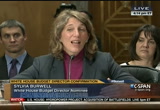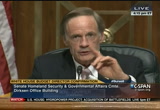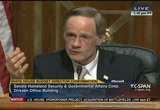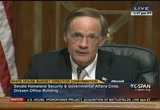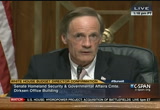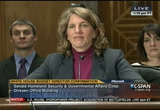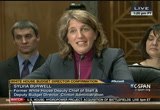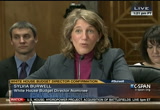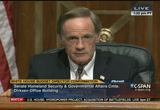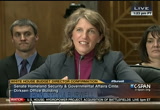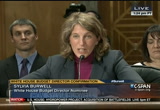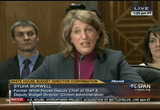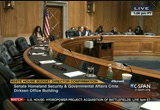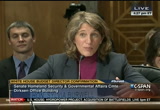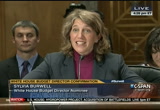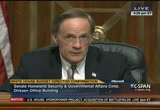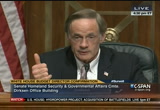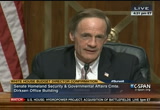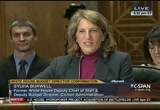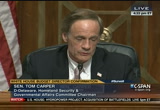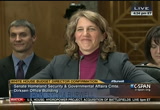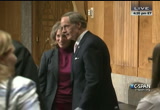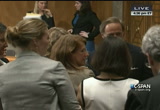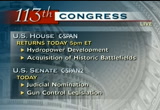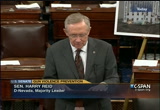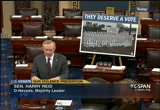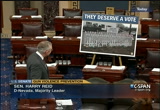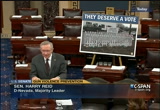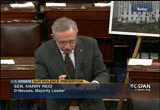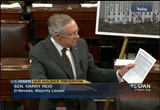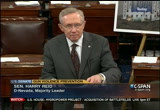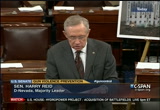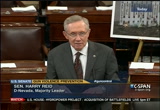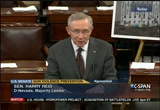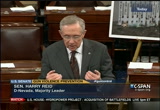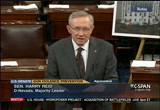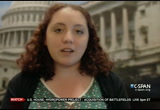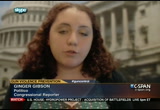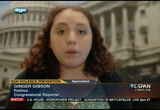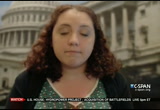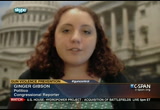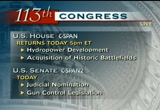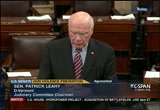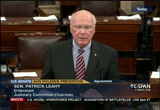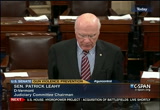tv Public Affairs CSPAN April 9, 2013 1:00pm-5:00pm EDT
1:00 pm
hagel. the president and so forth. this is something that he everybody agrees needs to be -- that everybody agrees needs to be revised. i can speak to the defense department because it's a complicated problem because there are other agencies of government and other branches of government that participate in the export controls process, but we in the department of defense have improved but need to continue to improve the speed and the technical awareness by which we make export controls decisions. . how are we organized for building partnership compass its? i think that's an area we can improve. so i take your -- i take your point and take your suggestions as we always do. >> the lady here in the second row, and this will be the pen ultimate last question. we will have one more after that. are you good?
1:01 pm
> ricki, australian national university. how important is it for japan to embrace collective self-defense for the rebalance to work effectively? 's ell, i think japan creasing awareness of the -- their own abilities, their own capabilities, and they're increasing freeing of themselves from the stricters they imposed upon themselves a few decades ago. they're doing it with respect to arms exports. they're doing it with respect to the kinds of activities they're willing to engage in internationally. and i think that's a good thing. u.s. assisted,
1:02 pm
if i may be so bold, process of healing and putting history behind in that part of the japan the it gives opportunity to play a role that it can, which is a very constructive role. they are involved in counterpiracy activities, maritime dome awareness, so forth. the areas where the world has a need and if japan can be part of fulfilling that need, that's good for everyone. >> also to give a tip to the hat to the australians who rin creasingly using the term independento pacific as opposed to asia pacific to make sure that india is part of that large swath of the region. thanks to australia.
1:03 pm
last question. lease, right in front. >> thank you, dr. carter. i follow-up with dr. green's question regarding the partnership and with the recent visit of mr. xi to mr. putin and focusing on the nuclear the fact in north -- and iran and pack pakistan on the nuclear capability, what is your assessment? d the southeast asia sea has -- [inaudible] >> a couple parts to your question.
1:04 pm
sorry. for those who weren't able to hear it. one was about china's relations to russia as they apply the region. and there i'll simply mention what i said already about the -- in connection with north korea. others russia, like beholding this situation in north korea, would like to see china exercise more of the influences with north korea. that would be a great way for china to exercise its influence. south china sea i addressed earlier. i said when it comes to these territorial disputes, they all have an individual history and so forth and as i said, the united states as a matter of policy doesn't take sides in
1:05 pm
those disputes. but -- and i said this in the speech -- we do take sides when it comes to how they're esolved. we believe they should be resolved peacefully. this is not the situation to use force, coercion. we definitely prefer multilateral approaches. we think that's the appropriate way to deal with these historic issues. that's why we're supportive of this process. >> we must call this to a close. if you want to tweet you can tweet best event ever at csis. >> best host. >> i would like to say a couple final words. first of all, we have some things out here for you to pick up. we've done a couple reports on u.s.-india defense trade, military engagement. also an important study on the pacific command. pick those up. i also paid close attention to
1:06 pm
what secretary carter said about the assignment that he got from leon panetta to realize the full potential of u.s.-india defense trade and to cut through the bureaucratic red tape. now, i think the only thing that he needs to do that is something i'm going to now present him from the chair and u.s.-india policy studies and that is the independento god who is the re-- indo god who is the remover of impediments. >> i need it. [applause] >> thank you all. please allow us a moment, stay in your seats and tweet or whatever while we get the secretary out. thank you very much. [captioning performed by national captioning institute] [captions copyright national cable satellite corp. 2013] >> the u.s. house returns from
1:07 pm
its two-week spring recess. gaveling in at 2:00 p.m. for legislative work. several things including one dealing with hydropower development in utah. another on the acquisition of historical battlefield sites. live coverage here on c-span 2:00 p.m. eastern. the senate came in this morning at 10:00 eastern and just a short while ago confirmed the nomination of patty schwartz to be the court on the third circuit court of appeals. they are in their weekly party lunches. when they return at 2:15 possible beginning of consideration of legislation that requires background checks for all gun sales. some of the families of the newtown shooting victims have been meeting with senators from connecticut, senators blumenthal and murray. republican leader mitch mcconnell joined 13 other republican senators yesterday who have threatened to block the bill from coming to the floor. follow the senate when they return at 2:15 on c-span2. we will hear more about the administration's view on gun control coming up at 2:00 p.m. eastern.
1:08 pm
vice president joe biden and attorney general eric holder holding a press conference in the nation's capitol. they will be urging congress to take up the senate bill, and they will also be joined by law enforcement officials. that's at 2:00 p.m. eastern over on c-span3. also on capitol hill, more coverage this afternoon here on c-span. sylvia, president obama's pick to be his next budget director, and she appears before the senate government affairs committee during her confirmation hearing this afternoon. she's a former deputy budget director during the clindon at mferings and currently serving as the president of the wal-mart foundation. that hearing at 2:30 eastern and again that will be here on c-span3. on c-span, rather. over on c-span3 at 3:00 p.m. eastern, the i.r.s.'s acting commissioner testifies before house subcommittee on his agency's 2014 budget. $12 billion.bout testifying at 3:00 on c-span3.
1:09 pm
next up, a discussion on iran's nuclear program and the role of the international community. we heard remarks from the director general of the international atomic energy agency during this panel. we'll show you as much as we can until the house gavels in at 2:00 p.m. eastern. >> it's a great honor for you to be introducing director general, the head of the international atomic energy agency. i've known the director general for the -- over 10 years when he was director general in another guise heading the disarmament nonproliferation and sciences department of the japanese foreign ministry. i knew him when he was ambassador in vienna, permanent representative to the iaea and when he was chairman of the board of governors of the iaea. he's headed the agency since
1:10 pm
december, 2009, after winning a hotly contested election. and he must have done something right in the year since then because he was just reappointed without opposition by consensus for another term. now, the general conference has to confirm that this coming september, so it's not a completely done deal yet. it's been a challenging 3 1/2 years for the iaea. the nuclear disaster at fukushima cast a pal on nuclear energy. north korea's provocations and its third nuclear test remind us daily of the failure of the global nonproliferation regime in this regard. the iran issue has gone from bad to worse. the agency's november, 2011, report laid out the harshest charges yet, but iran claims it was all politically motivated.
1:11 pm
the agency's governing board remains polarized. the spirit of vienna is in some cases a distant memory. to speak to some of these challenges and to look ahead for the next four years, the director general is going to come to the podium for about 10 minutes. then, we're going to engage in a bit of q&a. i'm going to take the role of a journalist, and then we'll turn over that role of journalists for you all for continued discussion. director general, the floor is yours. would you like to speak from the podium? [applause] >> good morning, ladies and gentlemen. i am very much pleased to have been given this opportunity to speak in front of such
1:12 pm
distinguished audience. i'm very much delighted because can see nice cherry blossoms here. [applause] as an average japanese, we miss cherry blossoms and hot spring. last week we went back to japan and this year, the season of cherry blossoms, was very early and i could enjoy the cherry blossoms and i enjoyed the hot spring. now i can enjoy the cherry blossoms again. so my second term starts with a good overwhelmen. today, i would like to talk very briefly about the contributions from the iaea toward creating a world free from nuclear weapons. we have various activities, but one of the most important, of course, activities in nonproliferation. before going into details, i would like to briefly explain
1:13 pm
the basic arrangement from multilateral nonproliferation system -- regime. nuclear n.p.t., all states agree not to use nuclear materials for purposes other than peaceful ones, and they are requested to conclude comprehensive safeguard agreement and some declaration to the iaea. he iaea, for its part, has the obligation and right to verify that all the nuclear material and facilities, nuclear facilities in the country is some uniquely for peaceful purpose. if the iaea finds that has
1:14 pm
noncompliance within the compress comprehensive agreement then the iaea board of governors reports it to them -- united nations security council and and the united nations security council adopts ppropriate measures. this arrangement seemed to worked generally well up until the 1990's, but with the discovery of secret nuclear weapon programs in iraq after the first gulf war, made it clear that at iaea was not well equipped and discharge its responsibilities. the response from the member states was the approval of the
1:15 pm
additional protocol which took place in 1997. with this additional protocol, the iaea has an expanded tool to have access to site information and people. i always remind the iaea member states that the additional protocol is essential for the iaea to give credible assurance that all the nuclear material in the country is for peaceful purposes. when i joined the agency in 2009, the number of countries with additional protocol was 93. 119.the number stands at this is quite impressive --
1:16 pm
in 3 1/2.progress the recent trend -- event, the iaea found the activities of constitute es noncompliance with the iaea safeguards. the iaea reported it to the security council and the security council adopted resolutions that these countries do not implement u.n. security council resolutions nd do not cooperate with the iaea as requested by the security council resolutions which are legally binding as they adopted under chapter 7. are focusing on iran dplk
1:17 pm
and syria. i'm sure you have lots of questions on these issues, so i would like to come back to this issue in the question and answer sessions. another area where iaea is lacking is the nuclear disarmament. i would like to make it clear nuclear aea is not disarmament administration body. it is rather the conference of disarmament in geneva or the first committee in the united nations that negotiate the nuclear disarmament agreements. or bilateral negotiations have taken place. what the iaea can contribute is make its expertise gain
1:18 pm
through verification available for the countries, if so requested. the iaea helped verify the disposal and dismantlement of nuclear weapons when south africa abandoned nuclear as ns and joined the iaea a nonnuclear weapon state. at our request the iaea is area of o more in an verification of nuclear disarmament. a very important area is the nuclear security. nuclear security means to the fissile material
1:19 pm
and radioactive material falling into the hands of terrorists. e iaea was involved in these has intensified its efforts since a decade. we have established standards, guidances. we have provided assistance. we have trained people, and we ve operated, started the illicit tracking database. we have already some 2,000 cases of illicit trafficking, many of them are not very important issues, but there are tried to ich some traffic high enriched uranium
1:20 pm
and the same people repeat. threat. s a real what we know may be the tip of the iceberg. the iaea cannot do more. however, we are prepared to function as the global platform to strengthen the nuclear security efforts. this july, iaea will host an international conference on nuclear security at the minister level. this will provide us with a good opportunity to take all of our member states, over 150 countries on board. we also have the experts gathering in vienna and discuss
1:21 pm
assistance, database and these discussions will help us establish the future nuclear security plans. my last point is about nuclear-free zones. as you very well know, we now have five nuclear weapon-free zones, and it has 113 countries . this is very effective tool to achieve the world free from nuclear weapons. d all these nuclear-free zones provides iaea verification. in autumn, 2011, the iaea
1:22 pm
hosted a forum on the nuclear weapon-free zones in the middle east. nuclear weapon-free zone mountain middle east with an issue with a long history. it is a very complicated issue. he idea of the forum is to learns from the experience of other countries. you may think that is simple and easy. actually it was not. it took us 11 years to come to reach agreement to actually host this forum. the result was very encouraging. of course we could not produce the agreement and it was not expected, but despite the complexity of the issue and despite the differences we could have a very constructive discussion in the forum.
1:23 pm
and i'm very happy we could have this meeting. it is of course up to member states in the region, the countries in the region to decide whether or not to establish nuclear weapon-free zones in that region of the world, but we really ought to help them. perhaps 10 minutes have past and i will stop here and i will be very happy to exchange views with you. thank you very much. [applause] >> thank you, director general. it's not only cherry blossom season, it's baseball season. let me start with a softball. as i said, you were reappointed without opposition. you obviously overcame the hesitancy in a some states had about your candidacy that they
1:24 pm
voiced four years ago. how did you do that? can you tell me what you look back these 3 1/2 years of your achievements, maybe lessons learned, maybe some disappointments and maybe looking ahead what you hope to do for an encore? >> the election in 2009 was a very difficult one. but it is very natural if there are more than two candidates from member states are divided and it happened in my case. it also happened with my predecessors. the director is elected, differences are put aside and they rally around the new director general. i am very pleased that i have received very strong support from all the member states in the past three years and a half.
1:25 pm
what have i done? i tried to pursue the objectives of the iaea in a balanced manner. i did not mention in my introductry statement, but the iaea is an organization with multifaceted objectives. nonproliferation is one thing, but making the nuclear techniques available for all the countries is another very important area. so in the past years, i tried to pursue these objectives. just for example, on iran, i provided the assessment of the iaea with clarity. syria. he conclusion on we have for -- hosted a forum on the nuclear weapon-free zone on the middle east. on nuclear safety, i never thought the huge accident like
1:26 pm
fukushima would happen in my country, but it happened and the iaea tried to do our best. of course not everything was perfect, but i am very happy that member states get together very quickly to reach agreement on the action plan and now action plan is being implemented. i mentioned the nuclear security in my introductry statement. and i tried to improve the management. the ea is now organizing safeguard -- with state-of-the-art equipment. the first phase was done under schedule. and within budget is many cases
1:27 pm
overrun and it takes time. i think it is one of the examples of effective management. on disappointment, i do not intend to talk about disappointment, but i wish we could have made more progress safeguarding -- the implementation of iran, dplk and others. also think it would be good if iaea have new peaceful application for nuclear techniques with some better -- better recognized. >> well, you hit that one out of the park. let me follow up with a fastball. you said that all the member
1:28 pm
states are favorable. there's one member state that's not so favorable. i think they've even called not just you -- yeah, they don't like you very much, that one member state. they seem to not like the agency much. they said that the agency has been infiltrated by terrorists and sabbateaurs. if you could overcome that level of distrust and move toward a solution to the iran nuclear crisis, you're going to be up for a second nobel peace prize for the agency, first for yourself. so do you see any solution any way forward, at least a way that the states can muddle through without iran getting to the point where they could make a dash for nuclear weapons without being discovered in time? or an alternative, worst-case
1:29 pm
scenario, a war being started to prevent them from getting to that any, any good ideas for the future? >> i think iaea is a technical organization, but we are operating in an extremely political environment. so i am not surprised that different countries have different views on what the iaea is doing, especially in the field of nonproliferation. this an we do to make fair, impartial and flexible? i have given thought on this issue. when i joined the agency, i ade it clear that i will apply a standard for all the countries. the standard is simple. all the countries have to freely implement the
1:30 pm
comprehensive safeguard and other obligations if there is any. i applied this standard not only to iran but to all the countries. in the case of iran, it is clear that the board of governors decided that some of the activities of the -- of iran constitute noncompliance with the safeguard agreement. with the implementing united nations security council resolutions. under this situation, what i has y is that, yes, iran placed 19 facilities under our safeguard and we can verify that the nuclear material in these facilities are staying in
1:31 pm
peaceful purposes. but as iran is not implementing fully comprehensive safeguard and is not implementing u.n. security council resolutions, we cannot provide credible assurance that all the activities in iran is peaceful purpose. my view, this is a very factual, impartial statement, assessment with clarity. what we can do for the future? again, the agency's view is very clear. by applying this standard, we have provided the assessment of the association with clarity. in any event, in any issue, having a clear understanding of the issue is the starting point . , i in november, 2011
1:32 pm
shared the information with and identified reas which iran has to clarify . and since january, 2012, the iaea and iran have been negotiating on reaching reement to resolve all the outstanding issues. unfortunately, we have not yet reached agreement. the way forward is clear. we have provided clear assessment. we have identified issues to be resolved. we are now negotiating to resolve these issues. we need to reach agreement, and
1:33 pm
then we implement it. the iaea is determined to resolve the iran nuclear issue through diplomatic means. resolving this issue through diplomatic means with fully cooperating with the iaea should be the interest of iran. therefore, i really hope that we can find -- iran and iaea will find common ground. >> thank you, director general. et me follow-up the modality structured approach. you've gone to tehran. your senior officials have gone there. so many times when you've gone here, it looked like you are almost at the verge of striking a deal, and each time you've gone there, no deal. what's holding up agreement? and a related question, is too
1:34 pm
much attention being paid to the issue of chen where some people think even if you go there you won't find anything after all these years, no idence of malfeasance, or is too much emphasis being placed on what happened in the past at parchen and elsewhere to the detriment of getting a handle on what is going to be happening in the future? since january of 2012, the iaea d iran have been negotiating on the approach. the objective is to clarify and resolve the issues,
1:36 pm
it should continue for that purpose. this is the reason why we have not been able to reach agreement. on that o we focus but, of course it is not the nly issue. we have already asked the other questions. we are asking iran to give us access to the site, but we are also asking access to people and information as well as to
1:37 pm
the site. since we identified the facility to which we want to have access, parchen is a huge facility, and in the past we have visited, but this time we have pinpointed a facility to which we wanted to have access and since we identified that facility, iran has engaged in very intensive and extensive activities. we may or may not be able to find some meaningful things, but if we find something, that is good. if we don't find anything, that is quite normal because it is not only iran that we are working with. we work with many countries, and when we have information that we want to clarify, we ask
1:38 pm
access and in almost all the case it is it turns out that there's nothing not normal. so the purpose is to clarify the issue. and if iran gives access to us at parchen, that will help iran because that is supposed to enhance the confidence in iranian cooperation with the aea. i continue to ask iran to give us access to parchin. >> you said in a recent interview, in addition to the information about nuclear activities of a possible military dimension in the past that this may be continuing now . nd the word now struck a chord
1:39 pm
with some headline writers. do you have information of that kind of information continuing in the current present tense? >> we have reported in the annex of november, 2011, report, we have information that iran was engaged in activities relevant to the development of nuclear explosive devices. e pieces of information indicate the activities before 2003 but some of the pieces of information independent crate the activities after that. as far as access to information , it is limited. nuclear activities are reducing. the i meant by now is that
1:40 pm
iran activities could be continuing up till now. about -- you may recall what i id was to ask iran to clarify. we do not -- by now does not mean we have the information that iran is conducting activities as of now. we do not know. we have the information, credible information that iran continued its activities beyond 2003, and that's what i meant. >> ok. ok. director general, the way the agency goes about the investigations with iran has wider implications with the way verification is implemented. the november, 2011, report, particularly the annex, relied on a lot of intelligence
1:41 pm
information from member states. most of whom probably have their own agendas. i'm wondering if there's any issue of balance between relying on intelligent sources from member states and the need for imparblet in order to retain credibility amongst all tates. -- combarblete in order to retain credibility -- impartiality amongst all states. >> during the first gulf war, t was determined that iraq engaged in secret nuclear weapon programs. and it became clear that the ea did not have sufficient
1:42 pm
tools. we have intensified efforts to collect as much information as possible. we use all the information available to us to conduct verification. er includes fast information collected by inspectors. we have a huge pile of information collected by our inspectors. this is essential source of information for us. we have also information from other sources. that is very helpful. we also have the information that we obtain, for example, through satellite imagery and some countries provide us with
1:43 pm
information, intelligence information. we cross-check all of the inspect the information, intelligence information and other information. we collect information over the period. we cross-check this information from a technical point of view, and we apply very critical this piece verify of information. we have proven, and we do not rush to conclusion. in the case of the november, 2011, report, we do not rush to the conclusion. as we stated is that
1:44 pm
have a variety of information, we believe that iran has to engage with us and clarify the information. iran has a case to answer. >> thank you very much, director general. i fear that i've focused too much on safeguards and there are pillars to the n.p.t. other aspects to work. let me turn to the audience. let me ask a question on a different aspect. in the aftermath of fukushima, what do you see as the role of nuclear power? and should the iaea still be promoting an energy source that seems to have so many problems? is nuclear power still beneficial, sustainable and responsible? >> the basic position of the iaea is that we respect the decision from each state. it is not us, the iaea, who decides, but it is the member
1:45 pm
states who decide whether to keep the nuclear power as part f their energy means or not. the fukushima accident gave a huge impact and gave negative impact to the confidence in nuclear power. was also a very important wake-up call to enhance nuclear safety. we have been following carefully of the trend after the fukushima accident. what we found is that despite the fukushima accident, many countries continue to include nuclear power as an important option. according to the latest estimates, now we have 437
1:46 pm
nuclear power plants in operation in the world. according to our low estimates, there would be 90 more nuclear power plants on top of these 437. it is the low scenario. in the high scenarios, there would be hundreds of nuclear power plants to be added. now in the world, 68 nuclear power plants are under construction. this is completely different to one area. ed after why did this happen? because the fundamental condition has not changed. until quite recently, we have from -- we heard from all political lireds, climate change is the number one concern of the world. and nuclear power has
1:47 pm
contributed and will continue to mitigate the negative impact of global warming gas. the price of fossil fuel is volatile. many countries would like to have energy security. he pollution causes -- air pollution causes -- according to a statistic, 2.3 million people die prema turrill cause of particle matters -- prematurely because of particle matters. he iaea estimate -- iaea estimate is not -- we ask countries. usually we put questions during this period, from april through july, and gather the
1:48 pm
information and combine them, and that is the estimate. the difference is that more emphasis is placed on nuclear safety. the pace of growth has slowed down or slower than what we anticipated or estimated before fukushima. but with slower pace and with higher emphasis on safety, nuclear power will expand. >> thank you very much, director general. i have more questions, but maybe i should give a turn to somebody else. why don't -- go to the microphones, there are microphones on either side and i think that will be easier than me trying to catch -- you trying to catch my eye, and maybe we'll take a couple questions at a time. and when you start, please identify yourself in the usual way and your affiliation. try to keep your questions
1:49 pm
short and without extended commentary. so we'll start over here, please. >> hi. warren stern, brookhaven national lab, former employee of yours, director general. so the safeguards regime has involved -- >> speak closely. >> so the safeguard regime has evolved substantially over the past decades from 66, 153 and of course the additional protocol often and reaction to crises. it's always best in reaction to crises to have a plan already written down or thought about. my question, sir, what do you see as the evolution of the regime? what do you see as the next big change to the safeguards egime? >> ok. question about evolution. we'll take a second question so you can think about that for a minute. others, if you want to be lining up to the mic. this side over here.
1:50 pm
>> thank you. trebin, harvard university. mr. amano, as you know the 2014 nuclear security summit in the netherlands is supposed to be the last in this series, and i note in your address you said that the iaea is ready to be the global platform for nuclear security. so i'm wondering whether you believe that the agency would be able to take over the role and functions of the nuclear security summit thank you very much. >> thank you. that was going to be my next question so you got it for me. so evolution of safeguard system and is the agency ready to take the hand off if given the handoff from the nuclear security summit? >> the safeguard approach has been evolving since -- decades ago. as i stated in my introductry statement, first we focus on
1:51 pm
the created facilities. then we found that was not sufficient. dditional pro-- protocol was approved. not all countries bring that to force. and we are collecting information from various sources and we have the obligation to verify the completeness and correctness of the declarations. now, we will continue to use all the important available to conduct our safeguard approach. also, technical development is very important. nowadays we have more sophisticated equipment. the satellite imagey did not exist when -- ima.j.ry did not
1:52 pm
exist when the verification started. we have the equipment that can transmit data on a permanent basis from the site to the headquarters. using more advanced technology the key to make the verification effective. we will continue to use all the by mation available to us critically cross-checking the information, we will use as much advanced technology possible to make the verification effective. regarding the 2014 nuclear security summit and iaea nuclear security activities, we are not viewing -- we are not
1:53 pm
putting the question to ourselves whether we will succeed the summit or not. we have our mandate on nuclear security. we have over 150 countries as r members, and we have a capacity to establish norms, provide assistance, provide training and maintain database. what we want to do, i do not exclude other important organizations from doing activities, but someone should function as the global platform to enhance, strengthen nuclear security activities, and we are ready to do that. whether the an 2014 nuclear security summit
1:54 pm
will end in 2014 or continue. it is not us to decide, but it is the participants of the security summit who decide. on our part, we will continue .o work the july, 2014 international conference on nuclear security is very important event to strengthen our activities. by the way, we have two priorities in the current budget process. one is technical cooperation. and nuclear safety and security. >> thank you very much, director general. let's take two more. in the back here. and then over here in the back. sorry. i think maybe you were first. ok. these two. go ahead.
1:55 pm
>> this is samantha. my question is the follow-up to trevor's and your answer. you mentioned the already existing organizations that work on nuclear security. i wanted to ask you, how do you envision iaea collaboration with these existing organizations to maximize all vailable resorgses and expertise and to avoid duplication of efforts? >> ok. collaboration among agencies, and was i right you were first here in front? >> thank you very much for your presentation. michael rosenthal from the nuclear detection office. i'd like to switch pillars. you said you wished that the iaea peaceful nuclear support program had more recognition. i'd like to ask you about one of them which i think is unique
1:56 pm
in terms of being a public-private partnership and that the the program for cancer therapy. i know you support that and i wonder if you think that would be one means to -- a vehicle to try to enhance the agency's recognition in those areas? >> michael, repeat the program that you mentioned. program for action cancer therapy. this is the one program that i think is unique and the agency is public-private and it has many partners in the industrial sector and also in other u.n. organizations. so the question, how would you support or grow that program and increase its recognition? and are there other programs in the peaceful users that would be advantaged by trying to develop public-private partnerships? thank you. >> ok. so the questions were collaboration among agencies and organizations in nuclear
1:57 pm
ecurity and public-private support in particular for nuclear applications, such as the nuclear therapy. >> first, regarding the coordination among the different players for nuclear security, one of the objectives f the nuclear security conference in july is to better coordinate nate the activities. we have invited various -- coordinate the activities. we have invited various players in this field and we have invited experts and we are very much willing to hear their views. different organizations have different expertise. same time, at the
1:58 pm
better coordination, better exchange of views is very useful. we are sending peer review missions to countries that can give advice to us and to the countries. and the international conference on nuclear security, that invites all the member states of the iaea, over 150, and international experts. we can have better views of what the stakeholders are doing that will help to better establish our plan on the nuclear security in the coming years. for the coordination, private and public and the international coordination on cancer therapy and others, this
1:59 pm
is a crucial element. the iaea is very much interested in cancer therapy in developing countries because this is the real issue. in the past, people tend to think that cancer is a disease in developed countries. that is not the case at all. 2/3 of this occur in developing countries. 2/3 of cancer patients in developing countries come to screening too late. therefore, we cannot give life-saving treatment. this is definitely a global health agenda. has - why has iaea evolved? we have techniques available to screen and diagnosis cancer. it is also very useful to -- for the therapy. i do not mean that we can do
2:00 pm
all. for example, it is not the iaea's role and i do not have the expertise how we get rid of smoking. health care system is not the expertise. and we know our limit. so we have made an agreement agency and iaea and working together. we have expertise in particular fields, but we know our limit. and we recognize the need to cooperate with other entities. the case of cancer, it is w.h.o. nowadays, they have financial means. they help us to finance cancer program.
2:01 pm
just for example, we have very important program for the plant mutation, food security, food fety and we have the joint it established by f.a.o. and iaea, and this joint unit is locomotive to promote and sprin nation's capital. it is a season of hope. in this chamber where the people's house gathers, we pause to offer you gratitude for the gift of this good land on which we live and for this great nation which you have inspired in developing over so many years. continue to inspire the american
2:02 pm
people that through the difficulties of these days we might keep liberty and justice alive in our nation and in our world. give to us and all people a vivid sense of your presence that we may learn to understand each other, the respect each other, to work with each other, to live with each other, and to do good to each other. so shall we make our nation great in goodness and good in its greatness. may all that is done this day be or your greater an honor and glory. the speaker pro tempore: the chair has examined the journal of the last day's proceedings and announces to the house his pproval thereof. pursuant to clause 1 of rule 1, the journal stands approved. for what purpose does the gentlelady from california wish to be recognized? >> mr. speaker, pursuant to
2:03 pm
clause 1 of rule 1, i demand a vote on the speaker's approval of the journal. the speaker pro tempore: the question is on agreeing to the speaker's approval of the journal. so many as are in favor say aye. those opposed, no. mrs. capps: request the yeas and nays. the speaker pro tempore: the yeas and nays are requested. those favoring the vote by the yeas and nays will please rise. a sufficient number having arisen, the yeas and nays are ordered. pursuant to clause 8 of rule 20, further proceedings on this question are postponed. the pledge of allegiance will be led by the gentleman from texas, mr. burgess. mr. burgess: participants in the gallery please join us in the i pledge allegiance to the flag of the united states of america to our flag and country. i pledge allegiance to the flag of the united states of america and to the republic for which it stands, one nation under god, indivisible, with liberty and justice for all. the speaker pro tempore: the chair will entertain requests
2:04 pm
for one-minute speeches. for what purpose does the gentleman from south carolina rise? wille geist i ask unanimous consent to address the house for one minute and to -- mr. wilson: i ask unanimous consent to address the house for one minute and to revise and extend my remarks. the speaker pro tempore: without objection, the gentleman is recognized for one minute. mr. wilson: mr. speaker, yesterday the world loss a true heroism for freedom. former british prime minister margaret thatcher will forever be remembered for her achieving victory during the cold war. barroness thatcher possessed great leadership qualities we can all learn from that contributed to her success. her promoting democracy led to the liberation of dozens of former soviet-occupied nations from communism to premarket democracy. prime minister thatcher's loyal friendships with president ronald reagan, pope john paul
2:05 pm
ii and the polish solidarity union leader changed history, standing up for freedom against the threat of communism. thank you, barroness margaret thatcher for your commitment to democracy. millions around the world were touched by your unwaivering strength and preserving freedom. you will be missed. in conclusion, god bless our troops and we will never forget september 11 and the global war on terrorism. the speaker pro tempore: for what purpose does the gentleman from tennessee rise? >> to address the house for one minute and to revise and extend. the speaker pro tempore: without objection, the gentleman is recognized for one minute. mr. cohen: thank you, mr. speaker. tonight, pbs and the grammys will continue a series of concerts at the white house. tonight's concert will feature memphis soul. memphis is the city known around the world for music, whether it's sun records and elvis presley and sam philips, or the studios which will be featured tonight, stacks records and high records. sam moore, justin timberlake,
2:06 pm
charlie, ben harper, sam moore, they'll all be there. memphis music is part of america's cultural history and living, breathing part of our culture. we're pleased that pbs and the them. will be featuring we ask you to come to memphis and visit the great reservoir of music history, memphis, tennessee. i yield back the balance of my time. the speaker pro tempore: for what purpose does the gentleman from texas rise? mr. burgess: mr. speaker, i ask unanimous consent to rise to address the house for one minute and to revise and extend my remarks. the speaker pro tempore: without objection, the gentleman is recognized for one minute. mr. burgess: thank you, mr. speaker. today i rise to congratulate the city of irving on the receipt of the 2012 mall come baldridge national quality award. this award is the nationest highest presidential honor for improvement and visionary leadership. irving, texas, is not just
2:07 pm
about lower tax rate and efficient government, the city of irving prioritizes feedback from its residence, achieving high level of citizen satisfaction, producing $4r5 million in cost savings over the past five years. through the implementation of a lean six signal program, the city of irving, texas, has lowered tax rates for its citizens, improved a quality of living. i congratulate the city of irving on its receipt of this award. i hope that with the federal government watching this, can learn and i yield back. the speaker pro tempore: for what purpose does the gentleman from rhode island rise? mr. cicilline: i ask unanimous consent to address the house for one minute. the speaker pro tempore: without objection, the gentleman is recognized for one minute. mr. cicilline: mr. speaker, today, april 9 is equal payday, the day on the calendar that marks more than three months into 2013 when women's wages finally catch up to what men earned in 2012. nearly half century after the passage of the equal pay act
2:08 pm
women continue to face unfairness in the workplace. according to the american association of university women in rhode island's first congressional district, women working full time year round still only make 83 cents on the dollar compared to the average man. for all the progress we've made in the fight for women's rights, the issue of pay equity continues to persist. that's why i'm proud to voice my strong support for the paycheck fairness act, a commonsense bill that would strengthen the equal pay act by providing effective remedies for women who are not paid wages for equal work. it is time for us to prioritize the long-term well-being of the nation's hardworking women, many of whom are heads of households and immediately pass this critical legislation to help ensure equality in the workplace. i yield back the balance of my time. the speaker pro tempore: for what purpose does the gentleman from north carolina rise? >> i rise and i ask unanimous consent to address the house for one minute and to revise and extend my remarks. the speaker pro tempore: without objection, the gentleman is recognized for one minute. >> mr. speaker, i rise today to honor the men and women of the
2:09 pm
third u.s. infantry regiment who for 65 years guarded the tomb of the unknown at arlington national cemetery. this continuously watches over the tomb of the unknowns 24 hours a day, 365 days a year through all kinds of weather. many don't know that the third u.s. infantry regimen pulls double duty, also maintaining tactical readiness, prepared to defend washington in the event of war or other crisis. the tomb holds the remains of the select unknown soldiers from world war i and ii, the korean war and the vietnam war. while only god knows their names, they died representing our freedoms. we should all be proud to live in a country that continues to honor their sacrifice, a country that doesn't forget that freedom isn't free. mr. speaker, i urge my colleagues to join me in
2:10 pm
thanking the soldiers of the o guard for their vigilance and dedication. thank you. i yield back my time. the speaker pro tempore: for what purpose does the gentlelady from california rise? mrs. capps: i ask unanimous consent to address the house for one minute and to revise and extend. the speaker pro tempore: without objection, the gentlelady is recognized for one minute. mrs. capps: mr. speaker, i rise today in recognition of equal payday. today is a day i wish we didn't have to mark. after 99 days of 2013, women have finally caught up with what their male co-workers earned last year. and while unequal pay clearly hurts women, it also affects their families. the additional $11,000 a woman would make each year if she was fairly compensated would pay for a year and a half of childcare or feed family of four with money to spare. as we continue to pull out of the recession, every dollar matters. and that is why hardworking women across this nation are counting on us to pass the paycheck fairness act and close
2:11 pm
this gap for good. we are listening, and we must act. our sisters, our dollars and our granddaughters deserve nothing less. i yield back. the speaker pro tempore: for what purpose does the gentleman from nevada rise? >> i ask unanimous consent to address the body for one minute. the speaker pro tempore: without objection, the the gentleman is recognized for one inute. >> today is the 50th anniversary of the equal pay act, the fight for equality and the reminder that the fight is ot over. nationally, women own 77 cents on the dollar compared to their male co-workers. my state it is 85 cents per dollar. mr. horsford: women head over 125 thoubd,000 house dled holds
2:12 pm
in nevada. closing the wage gap would provide needed and deserved income for these families and all families across the country. i am the father of a bright young daughter. i want the best for her and for young women across the country who have great contributions to make to our nation. and that's why i urge passage of the paycheck fairness act. yield back my time. the speaker pro tempore: for what purpose does the gentleman from wisconsin rise? without objection, the gentleman is recognized for one inute. mr. pocan: equal pay for equal work not only adheres to our country's founding principles of justice and equality, but it makes a huge difference in the families of wisconsin. in my district, women are paid 81 cents to the dollar that men earn, across the state of wisconsin, the number's even lower, 78 cents.
2:13 pm
324. equals $10, what does that mean? it means almost 2,800 gallons of gas. it means more than a year's worth of groceries and almost a year's worth of rent. the pay gap makes real effect on the families of wisconsin. almost 230,000 households in wisconsin are headed by women, and almost a third of those fall below the poverty line. eliminating the wage gap will provide much-needed assistance to women for those families who depend on those salaries. i'm proud to support the paycheck fairness act which makes important strides to ensuring that women get equal pay for equal work. this improves the lives of wisconsin women, families and communities. we have a moral need to pass it. thank you. i yield my time. the speaker pro tempore: the gentleman's time has expired. for what purpose does the gentleman from maryland rise?
2:14 pm
>> i ask unanimous consent to address the house for one minute. the speaker pro tempore: without objection, the gentleman is recognized for one minute. >> thank you, mr. speaker. last year almost 58% of college graduates were women and women now account for over half of the college educated population. mr. delaney: women were 53% of new hires and women account for 50% of jobs held by college-educated individuals. this is all very good news. yet, when you look at advancements we see another story emerging. it's estimated that when people are promoted to managers in corporations, only 78% of them are women. when vice presidents are made only 17% are women. this is not only a big problem for women but it's a big problem for our economy. it limits diversity of ideas which limits productivity. the gender gap hurts u.s. competitiveness by creating management structures that don't reflect the views of 50%
2:15 pm
of the population. it hurts families because women are economic anchors in the majority of families. 53% of working women are primary breadwinners and 15 million households are headed by women. we're creating an economic burden. the generaleder gap and wage gap is not -- the gender gap and wage gap is not reflective of the kind of society we want to live in. thank you. . the speaker pro tempore: for what purpose does the gentleman from florida rise? >> ask unanimous consent to address the house for one minute. the speaker pro tempore: without objection, the gentleman is recognized for one minute. >> thank you, mr. speaker. mr. speaker, i rise in support of the equal pay day because we are a stronger nation when our sons and daughters get equal pay for an equal day of work. as a proud father of a teenage daughter, i know that children deserve to have a fair shot at success regardless of their gender. when a woman in south florida is paid 86 cents for every dollar
2:16 pm
paid to the map for the same job, it creates a yearly gap for women of almost $6,000. that's real money. mr. garcia: it's nearly a year of groceries, five months' of rent, 30 months of gas. so in this new century with so many women serving as heads of households, and women being a critical part of our economic success, it's time we close the gender pay gap once and for all and pass the paycheck fairness act. thank you, mr. speaker. i yield back the balance of my time. the speaker pro tempore: for what purpose does the gentleman from georgia rise? without objection, the gentleman is recognized for one minute >> thank you. mr. speaker. mr. johnson: i rise to address wage equality in our nation or the lack of there. i was raised by a mother, school teacher, she worked hard. worked harder than any male that i know of on her job, and then
2:17 pm
when she came home she worked hard in the home. harder than any male i have ever known. and she turned me over to my wife. my wife works harder than i ever thought about working both outside the home and in the home. so i believe that it is a great tragedy that either one of those women would work with maybe less than a man doing the same thing on the job. i think it's terrible. 77 cents for every dollar owned by a man is what women make in my home state of georgia. i'm particularly alarmed by the wainl gap for minority women who often earn less than 64 cents than every dollar earned by a nonminority man. without equal pay, women working twice as hard -- we must continue to strive for income
2:18 pm
equality and support women in the workplace. i yield back. the speaker pro tempore: for what purpose does the gentlelady from connecticut rise? without objection, the gentlelady is recognized for one minute. ms. delauro: it has now been 50 years since congress passed the equal pay act to confront the, quote, serious and endemic problem of unequal wages in america. at the time when women were a third of the nation's work force, president john f. kennedy said that this would help to end, quote, the unconscionable practice of paying female employees less wages than male employees for the same job. today women are now half of the nation's work force, but they are still only being paid 77 cents on the dollar as compared to men. that is why today we are once again forced to recognize equal payday, the day, 2013, that a women's earning for 2013 catches
2:19 pm
up to what a man-made last year. unequal pay affects families all across our contry. they are trying to pay their bills, trying to achieve the american dream, and are getting less take-home pay than they deserve for their hard work. more steps are clearly needed to ensure women are paid what they deserve. we need to pass legislation that will end pay secrecy and give women the tools to ensure they are being compensated fairly. we need to pass the pay fairness act, men, women, same job. same pay. 50 years after -- the speaker pro tempore: the gentleman's time has expired. ms. delauro: make the dubious milestone of equal payday a thing of the past. i yield back. the speaker pro tempore: the chair lays before the house a communication. the clerk: the honorable the speaker, house of representatives. sir, pursuant to the permission granted in clause 2-h of rule 2 of the rules of the u.s. house of representatives, the clerk received the following message
2:20 pm
from the secretary of the senate on april 9, 2013, at 9:43 a.m. that the senate agreed to senate concurrent resolution 10. with best wishes i am, signed sincerely, karen l. haas. the speaker pro tempore: pursuant to clause 12-a of rule 1, the chair declares the house in recess until approximately 5:00 p.m. today.
2:24 pm
really very simple. and that is you have revenues coming in and expenditures going out and if the two don't match, you have to -- you have deficits. >> what we are seeing in the united states of america is call an exploding deficits, that's the revenues we have coming in to the federal government and spending going out. we have been running deficits of $1.42 trillion, $1.29 trillion, 1.3 trillion, and estimated $1.2 trillion for this fiscal year 2012. >> the simple answer to your question is, this country is spend morgue than we are taking in. it's a problem not just for the current generation, but more importantly it's a problem for future generations. we as a country cannot continue to spend more than we take in. >> where does the money that makes up the national deficit go?
2:25 pm
>> of all of the federal government's national spending, 20%, or about $818 billion, goes to the department of health and human services. $18% or about $725 billion goes to the social security administration. 18% or about $714 billion goes to the department of defense. another 18% or about $709 billion goes to all other departments. 16% or about $640 billion, goes to the department of the treasury and other. and 10% or $392 billion goes to interest on the public debt. >> what are the real dangerers of the increasing national deficit? >> the danger of the increasing national debt is financial ruin for our country. its financial instability. it will be run away inflation.
2:26 pm
it would have the collapse of our economy. and we are on the verge of going in a pathway that is going to be hard to recover from. >> this is huge. this is something that if we do not turn it around with the out-of-control spending here in washington, d.c., it will threaten your future. >> instead of spending time arguing over political views, political parties must work together to make peace and find a solution. >> i'm working all the time with democrats, republicans, and independents. sometimes i couldn't tell you for the life of me who i'm working with because we focus on solving problems and seizing opportunities and not fighting all the time. >> i intend to work with both parties to do more. >> when you make some tough decisions, we need to live within our means, cut out some of the pork, and start growing the economy again. with a combination of cuts, with a combination of growing the economy. with a combination of eliminating loopholes out there, that are inappropriately given to some businesstries out there,
2:27 pm
you can balance the budget, live within your means, grow the economy, and over a period of time get back to living within your means and eliminating the debt. >> we have to come up with the right type of tax policies that enable small businesses to be able to grow. we have to stop printing money to try to buy ourselves out of this problem. and the federal government there's no amount of money we can spend to rectify the situation. >> it's called the simpson bowles commission and they worked hard and came up with proposals and we should take those proposals that address them seriously. >> stop mortgaging our children's and grandchildren's future and get the spending under control. >> democrats, independents, and a lot of republicans across the country, as well as independent economists and budget experts, that's how you reduce the deficit. with a balanced approach. >> together we are on a mission, we are on a mission to move this nation forward from down and
2:28 pm
downturn, to promise and prosperity. >> both parties approach the issues before us from very different points of view, but time is truly running out on our nation structural deficits and our long-term debt and the need for us to address those. >> how will the increasing national deficit affect the future? >> for the first time the majority of americans now doubt that our children will have a better future. >> every again tration of americans leaves their children better off. that's the american legacy. sadly for the first time in our history we are on a path which will undo that legacy. >> i'm concerned with the amount of debt we have accumulated that if we do not address this debt crisis right here and now, that we are ensuring that our
2:29 pm
children will have less opportunities than we have all had. >> unfortunately that debt, that replamente in some form or fashion is not going to fall on the generation today, it's on the rising generation, the young people, my children, my grandchildren, and my great grandchildren will be shackled with that debt which will inhabit their ability to have the quality of life we have today. >> the next generation and for generations to come, as it is set up right now, i worry about my kids and grandkids having to pay debts that we have incurred, my generation has incurred. and that's fundamentally unfair in my mind. what we should be providing to the next generation, and the generations that follow, is not a debt but a surplus so you can continue to build on this wonderful country. >> let's get to work. >> so let's get it work. >> dear mr. president, let's get to work. >> congratulations to all the winners in this year's student cam competition. to see more winning videos go to
2:30 pm
student cam.org. >> here on c-span we are live at the dirksen senate office building for the confirmation hearing for sylvia burwell. she's been nominated to be the president's next budget director. the director of the office of management and budget. this is a senate homeland security and governmental affairs committee confirmation hearing. she's a former budget director with the clinton administration. currently president of the wal-mart foundation. should get under way shortly. we'll have it for you here on c-span. the senate itself is in today. they have gaveled back in. and our capitol hill producer reports that senator reid, the majority leader, just said he's going to file closure -- cloture on the firearms bill this evening which means the vote will occur thursday. she also says senator mansion since he's planning to give an update on the compromise legislation at 5:00 p.m. eastern. we'll keep you posted on that.
2:31 pm
the senate is in, you can follow that on c-span2. and the house gaveling back in this afternoon at 5:00. senator coburn, the ranking republican in the room, as is senator rockefeller, live coverage here on c-span. [captioning performed by national captioning institute] [captions copyright national able satellite corp. 2013]
2:32 pm
>> hearing will come to order. what i'd like to do is go out of order and to welcome all of you here today. senator rockefeller and senator coburn i believe have hearings, simultaneous hearings going on in the intelligence committee. they need to be in two places at once. even as good as they are, they haven't figured out how to do it. i ask senator rock felltory introduce our nominee and yield to senator coburn to whatever comments he wants to make. we'll just take it from there. regular order after that. senator rockefeller, welcome. >> if you promise all the time since you have been to west virginia because you have. >> lived there when i was a little boy. >> not just now. >> blue stone dam.
2:33 pm
>> i know. mr. chairman, 15 years ago i was honored to introduce somebody named sylvia matthews to -- during a nomination to become deputy director of the office of management and budget. and today obviously i'm moving up. a lot happened in her life. all of it good. but to be head of the office of management and budget at these -- this particular time in our nation's history is extraordinary position. we are going to be debating the best course for our country's future. it's going to take the wise, wise hand, we need somebody smart, strong leadership. we need the federal budget office to be good. sylvia matthews now burwell is absolutely the person for this job. i don't say that because she comes from west virginia, i say that because i know her really well and she's one of the most extraordinary people i have ever
2:34 pm
seen going through my various decades of life. i urge this committee to swiftly consider her, pass her, and crown her. i have written down here that i know sylvia, i have known her most of her life. i would say her entire life but that would be a ly. i met her when she was 8 and i have known her parents for years. cleo and bill. they set an incredible example for their two daughters, sylvia and stephanie. i have attended church with them. i have been with them at many major milestones, including the wedding reception of sylvia and her husband, steven. who sits behind me. and sylvia, you have to do alt introducing, all right. i'll be heading out. i could tell you that sylvia is brilliant. it's such a cliche, almost embarrassing to say, she's
2:35 pm
absolutely brilliant. she will never tell you that because she's modest, but i can tell you that because i'm right. people like her come very, very lair. she graduated from harvard and was a rhodes scholar, but she never forgot her west virginia roots which is key to everything i feel about her and i think it's key to all of her success. always grounded. always thinking of people and what she does. she's humble, she's hardworking, she's has integrity, she remains devoted to helping our nation's hardworking families, and she's proven that through everything she's done. her parents were greek immigrant grandparents. they came to this country, that -- the emotions of that, work of that, toil of that is very much in my mind. sylvia is a proud native of hanton, west virginia, not the largest city in america. but the 3,000 who live there
2:36 pm
would argue. it has a distinguished railroad history. it's nestled in the mounants of appalachia. it's really hard to get to. it's really hard to get to. and her friend, terry giles, right behind me, knows that very well. deep in the hills of appalachia. she could have made a fortune at any or all points in her life by switching signals and going off to what she was trained to do. she spent the majority of her life in public service, working at organizations that are helping people, foundations. there is no doubt that she is -- let me be more specific. sylvia previously served in the clinton administration as staff director for the national economic council. she of staff to the treasury secretary robert ruben. deputy chief of staff to the president, and deputy director of the office of management and budget. she was central to crafting the
2:37 pm
clinton budget in the late 1990's which brought us a whole lot of surpluses and something called prosperity and growth. there is no doubt, there can be no doubt that she's the person to tackle the challenges of today. debts, deficits are staggering. the tax code's riddled with complexity. and it needs her. it needs her guidance, her wisdom, her calmness. the country needs somebody with the experience and intellect of sylvia burwell at the center of the great debate. going to be with us for the next four years at the very least. the thought of rewriting the tax code to those of us in the finance committee is a staggering thought. having sylvia matthews burwell around will help. after her time in the clinton administration, she turned to philanthropic work, which was a natural thing for her. as president of the gates
2:38 pm
foundation, the global development program, which put her all over the world, and she headed that. and as you know that's one of the largest foundations in the world. it makes the rockefeller foundation look like a small piece of dust being blown blone down some street somewhere. and then recently she's worked for the wal-mart foundation. but she wants back in public service. not only does she understand budget issues, but she wants to put that knowledge to good use and put it to good use to balance and to reduce deficits and all the right things. but mostly to help people and help communities. that is sylvia matthews burwell. it just is. and that's why i'm so proud to introduce her. i'm furious i can't introduce her tomorrow, but i can't. joe man chen -- manchen will, he better not speak as well as i am. he has a statement he wants to
2:39 pm
put in the record, mr. chairman, for this hearing. >> without objection, his statement will appear in the record. i yield to dr. coburn who i acknowledge, we have as my colleagues know, we have a lot of members who come, usually senate, sometimes house as well, who come to be present and introduce a witness. almost never we find someone who has known that witness for -- since the age of 8. knows her family. wore shpped in church with them. it's an amazing recommendation. >> mr. chairman, it's interesting, the act of introducing her, presenting to a committee a candidate for a position, there's almost a cliche protocol about it. but in my mind this is an act of public service. on my part. i don't even think of what we all have seen so much of. can you say your three words. i'm talking longer than i should and i do not care unless you do.
2:40 pm
she's traveled the world. she's knows the world. the people of west virginia are so incredibly proud of her. always have been. she's always been that person looming out on top of the rest of us. who has a sort of -- not a superiority but a depth and an honesty and integrity which our state sorely needs. i present her to you with pride. i thank you. a we are happy to receive your recommendation and to hear her testify and take our questions. that was a remarkable, extraordinary introduction. we thank you for it. i don't know -- the years i spent as a little boy learning to fish on the new river, which flows right by there, i never saw anybody walk across the new river, but if anybody could with an introduction like that, maybe sylvia would be that person. >> i don't want to take that chance. >> i yield to dr. coburn, please. >> let me welcome you here and
2:41 pm
your family. and friends. we had a great conversation in our office. you are nominated to be the director of the office of management and budget. and congress has failed to do its job and oftentimes o.m.b. has failed to do its job. and i have a lot of confidence that you can actually make a very big difference for our country in how that office executes strategies to actually help us solve some of our problems. i have a statement for the record, mr. chairman, which i'd ke to put in, and due to the intelligence committee meeting that i think is really a priority for senator rockefeller and i will not be here, i will submit questions for the record so we have them on the record and can i call you later and say here's what you said. we welcome you to the committee. appreciate the fact you would come back and serve. we don't have enough people willing to do that right now and there is no question you are highly qualified for the position. thank you. >> thank you very much.
2:42 pm
senator rock federal, thanks so much for joining us. dr. coburn, if you can come back, you are more than welcomed to. i think before we do anything else, i'm just going to ask our nominee if there is anyone in the room that you would like to introduce to us. you are welcomed to do that at this time. >> thank you. thank you, mr. chairman. i'd love to interdues my husband, steven burwell, and my brother-in-law, one of my college friends, linda, and one of my best friends since i was 4, terry giles from linton, west virginia. >> that's great. we are delighted you are here. i was kidding before we started off, say to my colleagues, i was kidding steven about his middle name being lucky. i think his wife believes her middle name is lucky. i think they are both very fortunate. we are fortunate that you would be willing to share your wife. i know you have a young family. it's extraordinary gift that both of you give to our country
2:43 pm
at this time. today as senator rockefeller said we meet to consider the nomination of sylvia matthews, . math -- mathews it's a critical nomination as we know it comes at a critical time in our nation's history. o.m.b. has lacked a senate confirmed leader since i think january of last year, more than a year. when then director jack lew left to become chief of staff at the white house. folks who know me know i am a big believer in the power of leadership. throughout my life and career i have seen the impact, i think we all have, of dedicated, talented leaders, first hand and learn how good leaders can be critical in turning around struggling organizations and providing essential guidance during challenging times. this is one of those challenging times. leadership is an important and
2:44 pm
often undervalued asset that can determine whether or not an organization of any size or scale could effectively accomplish its mission or missions. that's why i have long been concerned about a problem that's plagued the executive branch through both democrat and republican administrations. numerous and long-standing vacancies in senior positions throughout the federal government. the problem has become so pervasive i have started to refer to it as executive branch swiss cheese. we are lacking critical leadership in numerous positions in the executive branch in just about every agency undermining the effectiveness of our accountability of our government. and while congress and the administration have taken steps to address this problem, the fact remains that we still have more work to do to ensure we have talented people in place to make these critical decisions and hold accountable. that's one of the reasons why today's confirmation hearing is so important and why i'm pleased that president obama has put
2:45 pm
more -- more than pleased, delighted that president obama has put forward a nominee who i believe has the killings necessary to step in and be effective not in a week or two or year or so, but right now. miss burwell's prior experience in government has prepared her well to lead during this challenging period for our nation. at a time when we can no longer afford making the tough decisions that are necessary to put our nation on a sustainable long-term fiscal path. she served as deputy director of the office of management and budget. deputy chief of staff during the clinton administration at a time when our government got its deficit under control and achieved four balanced budgets in a row. she's someone who knows firsthand how challenging budget negotiations can be, but she's also someone who knows that it's not only possible but imperative for the congress and the president to reach a bipartisan agreement on a comprehensive long-term budget plan. miss burwell also brings
2:46 pm
valuable leadership skills from the private sector where she helped run two of our nation's largest philanthropic first down aidings, bill and linda gates foundation, and the wal-mart foundation, i think spent some time in mckensy as well as management consulting. in all of the jobs she's held over the years, mrs. burwell has shown a great work ethic and intellect and strong business perspective. she's also a warm and gracious person and someone who can build consensus across party lines at a time when members of both parties need to setaside partisan considerations for the sake of our country. these qualities in my opinion can be attributed in large part she hails from hinton, west virginia, a wonderful little town, where i was once privileged to live as a wee lad. these qualities have made her an effective leader since the day she arrived in washington and as a young member of president clinton's economic team, her
2:47 pm
wisdom in both the public and private sectors will be put to use in addressing fiscal challenges much more severe than the challenges she addressed in the 1990's. for some perspective on the serious nature of our nation's debt and deficit crisis, i just note that in fiscal year 1993 he deficit was $255 billion. congressional budget office now projects the deficit for this country to be $845 billion. that will be the first time in five years that the deficit actually dipped below $1 trillion. in 1993 debt as a percentage of gross domestic product was 49%. today it's approaching 76%. the grand budget compromise that i believe we need to address this fiscal crisis must have, i think, three essential elements. it must address both spending and revenues in a balanced approach. must rein in the cost of our entitlement programs in a way that do not disadvantage our sabotage the poor or elderly. it must demand that better
2:48 pm
management of our government programs, something that senator coburn has already referred to. we ought to deliver better services to the american people at a lower cost in almost everything that we do. this committee is important partner with the office of management and budget in all of these areas, but especially in ensuring that our government achieves better result for less taxpayer money. both congress anti-executive branch bear equal responsibility in rooting out waste and fraud and abuse in government programs and just playing he inefishency. both bear responsibilities, both, the legislative and executive branch, bear responsibility in ensuring we measure the performance of programs and alter or end those programs that do not work or outlived their usefulness. both of us bear responsibility for providing transparency to the public, transparency on how our tax dollars, their tax dollars are spent. dr. coburn and i have worked closely together over the years
2:49 pm
to identify sensible, achievable savings that can be accomplished simply through better management. i'll mention a couple. we know that we can save billions of dollars by shedding some of the thousands of pieces of federal property that we no longer use. we know we can save billions of dollars every year by further redution the amount of improper payments our government makes, still over $100 billion per year. we know that we can save billions in federal contracting every year through the efforts such as so-called strategic source initiatives which involves buying more in bulk. we can save billions of dollars through better management of our government information technology infrastructure, including, for example, by continuing the efforts to consolidate federal data septemberers. and we can bring in billions of dollars in revenue by doing a better job of collecting taxes owed but not paid. here i'm not just talking about new taxes. i'm talking about doing a better job of collecting the taxes that are already owed. some of which have been outlined and point --ed out our by
2:50 pm
subcommittee on investigation. i know from my conversations with mrs. burwell she's fully committed to all of these efforts and more. she's also committed to helping improve ways to 34esh sure the performance of government programs and to ensure that we have sound financial management practices across the government, including at the department of defense, which in its whole history has never been able to conduct a full audit of its finances much less obtain a clean audit. as you sit here 20 years after you first came to washington, i do think it's instructive to look back and reflect on the budget debate of those days when like now we face deficits, long-term debt problem, and many days seem insurmountable. just over 20 years ago, january of 1993, president clinton's nominee to be the director of the office of management and budget, then congressman, my colleague at the time, leon panetta, appeared before this committee and he talked about how the american people didn't
2:51 pm
trust the government any more. he spoke of the importance of making the budget process work so that our government could start to restore that credibility. this is what he told this committee. 20 years ago, he says, we need to make government more efficient. more creative, make it an instrument of long-term economic growth, not an impediment. and make it a source of investment in our future not a robber of our children's birthright. all of those words ring, i think even more true today. the american people will not and should not tolerate congress and the white house kicking the can down the road any longer on making tough decisions. nor will they tolerate our failure to make significant progress in addressing some of the tough management challenges faced by agencies across government. so my strong recommendation to my colleagues today is that we confirm this nomination of mrs. burwell, properly, so she can bring her considerable kills and intellect to bear on the work
2:52 pm
that the american people sent her here to do. if you'll bear with me another 30 seconds. when the president submitted the name of sylvia burwell to be the o.m.b. director, i know they worked together in the clinton administration, i said erskine tell me what you know about her? he took me back in time to the late 1990's, you at the time were maybe chief of staff to bob ruben as i recall. he said that he was in a meeting in the oval office with bob ruben, the president, leon, erskine, and you four of you. and i think the president was grilling bob on a particular issue. and he was maybe struggling to respond. you handed a note to bob ruben. he read it. gave the president a brilliant answer. as the president was aing and awing over the brilliance of the answer erskine interrupted and said mr. president, i think i have broken the code here. ruben isn't that smart.
2:53 pm
it's sylvia. that addresses the issue you raised. that is high praise for a guy i respect enormously. we are grateful you are here. our best to the folks who raised you for doing a terrific job with you. one sister? one sister? you turned out well. i know hinton, west virginia, they are proud of you. so am i. with that having been said, we turn next -- i want to say -- senator johnson, ok. >> thank you, mr. chairman. i apologize i have to go to another hearing. i just wanted to say this is an incredibly well qualified nominee who is well-known to many of us in her previous incarnations. there must be some character flaw that she wants the job, but other than that i think that she
2:54 pm
is very well qualified. you can -- the witness can see how controversial her nomination is by this packed committee, but this is an excellent choice and i wish her well. maybe before she leaves she could get us some discounts at wal-mart before then. congratulate her on her nomination. i thank you, mr. chairman, for allowing me to say a few words. >> thanks so much for being here and for your comments. i'm going to go through some -- a brief interducks, very brief, and ask a couple of questions. then we'll turn it over to you nd then my colleagues. sylvia burwell has filed responses to a biographical and financial questionnaires. answering prehearing questions submitted by the committee. we had her financial statements reviewed, without objection,
2:55 pm
this will be made part of the hearing record with the exception of financial data which are on file and available for public inspection in the committee offices. our committee rules require that all witnesses at nomination hearings giving their testimony under oath and i'm going to ask if you would just to stand and raise your right hand and respond to these questions. do you swear the testimony you are about to give to the committee will be the truth, the whole truth, and nothing but the truth, so help you god. >> i do. >> please be seated. why don't you go ahead at this time and make your statement. i'll come back and ask you questions. >> thank you. thank you, chairman carper, thank you, ranking member coburn, for and that entire committee welcoming me today. it's a privilege to be considered by this committee as the president's nominee for the office of management and budget. i want to begin by thanking
2:56 pm
senator rockefeller for that kind introduction and i will just say i don't know he actually remembers it. he for me embodies the values of my small town in west virginia. it was many, many years ago that the senator visited hinton and at that time he gave his first interview to a group of young reporters. we were actually in the sixth grade and started our own newspaper. and it was just a reflection of his caring and commitment to the youth of our state. and his willingness to engage with the young people of the state of west virginia is just a reflective of what an incredible role model he's been in terms of public service for me and for so many others. i thank him for that and the tireless work that he's done in the state of west virginia and for the nation. i'm pleased that my husband and my brother-in-law and friend could join me. our 5-year-old and our 3-year-old chose a park over hearing their mommy answer questions. so they are not with us today.
2:57 pm
i understand the sacrifices entailed by public service and i recognize that one of the biggest burdens often falls on one's family. so i deeply appreciate the support that my family is giving me as i take on this new challenge. i'm also grateful to president obama for nominating me to serve as the next director of the office of management and budget. it's an honor to be considered for this position at this important time. and finally, i want to thank the members of the committee and their staffs for the meetings that have occurred over the past weeks as i have come to prepare for this hearing. i appreciate everyone's time. those i haven't had the opportunity to meet with i look forward to doing that. what i hope is that those meetings are the beginning of a conversation. that if confirmed we can continue. i believe in the greatness of our nation. as the second generation greek american, my family and i been fitted greatly by the opportunities this country has offered. and our nation has made
2:58 pm
important progress over the last four years. we pulled out of a deep economic downturn. oufer financial markets have stabilized. businesses are hiring again. and we begin the long journey to put our fiscal house in order. the president and the congress together have made progress on the deficit, but there is much more to do, and we need to focus on making the economy work, for middle class families and american business in both the short and long-term. harkening back to. so phrases and words of leon panetta. if i'm confirmed, my primary focus will be to contribute to achieving balanced deficit reduction, increased enishency -- efficiency and effectiveness in how our government works, and targeted investments that help this economy grow and create jobs. the president is actively engaged with members congress on the subject and if i'm confirmed, i will do everything in my power to keep this
2:59 pm
dialogue going and to continue to build on the relationships between the administration and members on both sides of the aisle. from my experience in the clinton administration at o.m.b., the white house, and the treasury department i learned the importance of working together in a bipartisan fashion to get things done. i saw firsthand how we had to come together to get deficit reduction agreements in the late 1990's. i know that we all come to the table with firm convictions and the belief that we know the right answer. but i also know that we all come with the same conviction to serve the american people, which i hope is what will drive us to find common ground to move the country forward. there is no question that the road ahead will be difficult. the challenge we face -- challenges we face are sobering. i'm confident we can come together on a comprehensive plan. i'm pleased with the prospect of returning to o.m.b.
3:00 pm
i have tremendous respect for the interconstitution and the incredibly talented men and women who work there. i'm hopeful that film' confirmed i can contribute to ensuring o.m.b. is a place where talented people want to go and that the institution is strong for other administrations. although it is even more important than ever that we are operating the government in the most efficient and effective way possible. i want to credit this committee in asking the directors for their strong leadership in these areas. and if i'm confirmed, i want to build on these efforts and continue to increase the firbletsy and effectiveness of taxpayer dollars. by governing smartly and by going good stewards, we can increase the value of what is delivered. as someone who has been out of government for now 12 years, i'm hopeful that i can bring a fresh perspective to the fiscal debates under way. from my positions at the
3:01 pm
wal-mart and bill and linda gates foundation, i have the seen the important role the sectors play in the lives of american people. if i'm confirmed it would be an honor to dedicate myself to using the tools of o.m.b. to ensuring that our government delivers for the american people. again, i want to thank the president for giving me this opportunity and the committee for considering my nomination. i look forward to answering the questions that you may have. thank you, mr. chairman. >> thank you so much for that statement today. and to our guests for joining us as well. i'm going to ask four questions. i'm going to yield then to senator johnson for a couple of questions that he might like to ask. i think you may have heard these questions before. but i'll just start off by saying. number one is, is there anything you're aware of in your background that might present a conflict of interest with the duties of the office to which you have been nominated? >> no, i'm not. >> ok. do you know of anything personal or otherwise that would in any way prevent from you fully or
3:02 pm
honorably discharging the responsibility of the office to which you have been nominated? >> i do not. >> and do you agree without reservation to respond to any reasonable summons to appear and testify before any duly constituted committee of congress if you are confirmed? >> yes, sir, i do. >> all right. so far so good. senator johnson, please. >> thank you, mr. chairman. welcome. welcome to your family and friends. i also enjoyed our meeting earlier. and appreciate your willingness to step forward and serve. it is a sacrifice, particularly with a young family. you though what you're getting into. thank you for your willingness to do that. i also have an opportunity to question you during the budget committee confirmation hearing as well. let me concentrate on the management side. from my standpoint, the regulatory side. i was in wisconsin the last two weeks and visited one company
3:03 pm
which i don't want to name, but they were talking about the new boiler mack rule. that they've had an engineering study conducted on it. it will cost them about $5 million to hopefully be able to comply. that was the cost. the benefit, and this is an independent engineering study, you -- they would be able to reduce the nontoxic particulate matter coming out of their operation by two dump truck loads full per year. that's it. to me that certainly qualifies unthe law of diminishing returns, that's something we really need to take a look at. and so in your position as o.m.b., what would be your response to that? how can we do a far more effective job at evaluating those types of regulations that have such a high cost and such a minimum benefit? >> senator, not familiar with that specific example. but in terms of overall velocity and how we can work to make our
3:04 pm
regulatory system work in a more effective way, i think it's starting with what the principles of what we're trying to do with the regulation and thinking through the issues of we do the regulations in order to promote health, safety and the environment. at the same time consider how those regulations impact the economy, economic growth, innovation and jobs. and putting those things together through a process of which i -- of which it is an important part. an important part of making sure that things are appropriately considered, looking at the cost-benefit analysis which agencies do. thinking through, have the appropriate parties had an opportunity to comment and been a part of the discussion and whether that's inside the government or outside the government. and so if i am confirmed, i look forward to helping that in terms of implementing that oversight role in regulation. >> ok. you raised an important issue in terms of having people affected by regulations having input into the process. between 1998 and 2010, the
3:05 pm
opportunities for public comment has really declined. in other words, the times regulations have been issued without opportunity for public comment has basically doubled from 18% of the time to 35% of the time. is that something that troubles you? is that something you'd direct your attention toward solving? >> i think there are two elements to that question. the public comment. one, i think you're referring to interim rules. the issuance of interim resumes and the use of those as a tools. if i am confirmed i want to make sure that any use of interim rules is appropriate. in the broader category of regulation, one of the things that i think has changed since the time i was previously at the management -- office of management and budget is people can comment using technology that so that expands the ability for people to discuss and comment in the rule making proelse is. i think as we think about public comment and transparency, we want to think about it over the entirety, but with regard to the specific issue, interim rules, that's something that i want to
3:06 pm
understand how and why those rules, when they are interim, what are the decisions and how they're made. >> ok. one of the macropieces of information that's pretty eye-popping to me when i came here was a study commission by the small business administration or this administration that tried to put a figure on how much a cost complied with federal regulations and their result was $1.75 trillion per year. put that into perspective, that's a number that's larger than all but eight economies in the world. i know some people dispute that figure. i have no idea how particularly accurate it is other than we know the regulatory burden is huge. is that something you acknowledge? do you dispute the figure or -- again, do you just acknowledge the harm that the regulatory burden is causing to economic growth and job creation? >> senator, with regard to the issue of small business, one that my father was a small businessman, and so i understand
3:07 pm
and appreciate that he was an opt tomorrow terrorist. when i think of that as o.m.b., i think it cuts across a number of areas that are important. and one is in the regulatory space and i think that's an important role that o.m.b. has in making sure that s.b.a. and small business has a voice. and i think that's part of the oversight role. i think throughout a number of other different areas in small business, whether it's in the area of strategic sourcing, the strategic sourcing leadership council has seven of the largest contracting members and small bills. so that that voice is at the table. or as we think about questions of insourcing and those types of topics, making sure we consider small business. so i think across the board, the issues of how different actions of government affect small business are important and one of the most important things we can do is make sure the right voices are at the table. >> what proposals have you heard coming out of -- potentially out of congress that would help modernize our regulatory burden? >> that is something that -- one
3:08 pm
of the things i'm hopeful, if confirmed, that i can get deeper into, where are the places where people think things aren't working? for instance, the lookback that has occurred, and again something related to small business in terms of the lookback and thinking about things, regulations we no longer need, that's a process that's ongoing. there were 500 things identifyified. how is that process going and should we build on that process, change that process? what are the specifics? because one of the things that i think is important in thinking through the tools that o.m.b. has or doesn't have is what's the outcome we're trying to get and what's not working right now? are there places we do have best practices that are working that we need to build on? or are there places where things aren't working, we need to stop. so if confirmed what i would like to do is understand what that list looks like, working with this committee, to understand that so we can get at the ones that are the largest and the most important to change. >> just a quick suggestion. we heard -- we held a pretty
3:09 pm
interesting hearing chaired by senator mark warner about the british one in, one out rule. so for every new regulation you had to find one of equal or greater compliance cost to get rid of. i'd go more one in 10 out. but that's an editorial comment. one last quick question, i believe this committee has been very well served by the efforts of g.a.o. it's really one of the areas of government where we've cut their budget. fiscal conservative would be one of those areas where i'd like to increase the budget. i'd like to get your assessment on that and your level support for the g.a.o. >> i think the g.a.o. is an important for all of us as we try to move to more effective and efficient government. in the report that came out today is something i think we need to take a close look at and work on. i think the administration has in some cases worked on those issues. i know that the congress has as well. but i think g.a.o. is an important partner to have these conversations, looking for those opportunities to make government more effective and efficient. and i welcome that opportunity
3:10 pm
if confirmed. >> thank you. look forward to seeing you tomorrow. talk about budget. thank you, mr. chairman. >> thank you, senator. >> i greatly enjoyed also our discussion. as you came to my office. and our free-flowing exchange of ideas. and i'm here today kind of ironically in a room that's not very packed with people, realizing that this is probably in my opinion one of the most important confirmation hearings that i will attend in the next four years. why do i say that? if you ask any american today, they are deeply concerned. about the fiscal condition of our country. h -- not just because they hear it on the news but because they know that in many ways we're mortgaging our children's future. and we if we don't get a handle on, it we won't be successful into the future.
3:11 pm
i applaud you for stepping up in a very trying time. i want to make sure that you know, at least from my standpoint on this committee, i intend to be a great friend and a great advisor to you in the many circumstances that you'll confront. i just want to follow up on a couple points. one is leadership. you know, i read your resume and i know that you've been one of the folks who have been in the back passing notes forward. and i want to make you sure that you know that our expectation is that you're going to be sitting at the table, a full partner with the president and with the cabinet in solving our fiscal crisis. and that you feel that that is in fact the authority that you've been granted by president. >> yes, senator, do i feel that. i feel very comfortable and confident that i will be a part of the president's economic team. and be a part of those conversations in a very real way and an important way.
3:12 pm
and it's been my experience probably from folks like bill gates to mike duke, the c.e.o. of wal-mart, that i am not a shrinking violet in the room. >> somehow i had that sense when you and i had that visit. i also want to piggyback on the discussion that senator johnson just had about regulatory reform. this isn't make-believe. this is real and all across all the corners of america. people believe in clean water, they believe in clean air, they believe in safety regulations. but they see things that are happening in their business that make no sense. in fact, i joke a little bit that i'm going to write a book and it's going to be entitled "that makes no sense" and the going to be 1,000-plus pages. because every day i hear things that make no sense. and we've all been, at least i've been in my life, a regulator. and i know how people who write regulations think. and i know how much leadership
3:13 pm
it requires to ratchet that zealous, i want to make things perfect in the world, behavior, when that may not be the best way to manage it. i think from my standpoint, the best way to understand regulation, the best way to understand what senator johnson's been talking about and what i've been talking about is actually reaching out to those who are regulated. not just the agencies who are zealous, but reaching out to the people at, in my case, in the grain elevator that are sweeping their floor constantly, with very little risk to anyone, because no one's ever on the ground there, but yet that's a regulation that they're required to comply with. or our small community banks who are struggling under the regulation of -- and basically forced to no longer do mortgages. so i want to know what you're going to do to bypass what we call the beltway mentality and to actually visit with north
3:14 pm
dakota and american businesses and with those folks who work every day struggling to meet compliance burdens. >> i think as senator rockefeller mentioned, during my lifetime, minority star is being from a small community and a small town and knowing and thinking about the issues from that perspective. and i will hope that during this -- there's never been anything but minority star and will continue to do that. this you are with -- with your specifics, your point about leadership is an important point. in terms of making sure that there is a culture and a thought process and approach. i think it is a signal that in mention small businesses three different ways, the way they interact with o.m.b., the signals i send as a leader i think are a very important part of the application of the processes that exist in ways that get to the outthat you're talking about
3:15 pm
-- outcome that you're talking about. i understand it's my responsibility as part of leadership and to use those processes that exist and answer the question that senator johnson posed which is, if there aren't enough tools and we don't have think we can get it done, what tools do we need? that's what i would like to try to do. >> we would just like to believe that at the table is not just the bureaucrats who are driven to make the world perfect but that there are people who are experiencing real life conditions and conclusions as a result of these regulations. and there's legitimate fear out there. and you've seen it and i've seen it in almost a daily visit with people in my communities and my home state and i'm sure many communities and states across this country. i want to also talk a little bit about the interaction between o.m.b. and let's say the bureau of reclamation. you know that i have a
3:16 pm
particular concern about a record of decision and this isn't even about the merits of the case. you and i can debate the merits of the case. but my concern about this is that there is a lack of decision making which absolutely frustrates people in the real world when they know they have to make decisions at a timely basis. i'd like to hear if you're willing to make a commit am to -- commitment to really look at those things that have been hanging for a long time at o.m.b. and don't seem to get resolved with the agencies or they get tucked away into a corner without any real attention to resolving the controversy. >> senator, you have my commitment that if i am confirmed, what i want to do is have a relationship where we can have those conversations. where when you pick up the phone , let me know what the concerns are and i have the ability to have a dialogue and say, here's what -- look into it, understand it and have a conversation about it. and so that is what i am committed to do and believe is a very important part of
3:17 pm
relationship building. is a dialogue. an ability to hear, listen and then actually communicate back and be all right with saying, here's what my understanding of the situation is and be able to do that. >> just one final comment. i'm thrilled that you're going to be at o.m.b. i'm thrilled that you're willing to step up and take on this challenge. because i think you're probably the right woman for the job. probably the person who is going to really begin to bring some faith of the american public back into this fiscal process and i want you to know that speaking just on my behalf, but i'm sure for this committee, anything that we can do that helps you address the needs of this country and move this country forward and we look forward to working with you. >> thank you and i think you probably get a sense that i'll probably pick up the phone and call. >> thank you, senator heitkamp. senator portman, please, welcome. >> thank you, mr. chairman. and thank you, ms. burwell, for
3:18 pm
being here. you and i talked kind of more about the job than we did about the issues i'm going to raise today. but having had the honor of having that job, you said earlier, which is o.m.b. is the place where talented people want to go, ought to be your goal. and you're fortunate because you are inheritting some really talented people. of the roughly 500 people who were there when i was there, you know, i owe them a lot. they were some of the best and brightest in public service and they're drawn there for a reason, they care about government efficiency, they care about budgeting, they like balanced budgets. and so i know you will use them as great resources and having been there before, you understand the importance of those -- of the people and the job. it's a tough job. and it's the only job in the cabinet where you can measure your success not by how popular you are but how unpopular you are among your fellow cabinet
3:19 pm
members. and if they start to like you too much you're not doing your job. so that will be a good measure for you. tomorrow we'll talk more about the fiscal challenges we face and hopefully the president's budget will offer some hope tomorrow. there will be lots to talk about. you're going to end up being there during an interesting time. but today let's talk about the m in o.m.b. which is a really critical part of the job and sometimes overlooked and probably was the most fun part of the job for me and i think will be for you, senator heitkamp and senator johnson raised great ideas on the regulatory front. you said you were looking for ideas, ways to improve the regulatory environment. let me give you three really quickly, get your response to them. one is how about having a regulatory agenda for nearly -- agenda? for nearly three decades presidents of both parties have written their plans. it's required by executive order that was issued under president clinton. it's also required by statute, the regulatory flexibility act. the publication in the spring and fall is by statute.
3:20 pm
it's very important because it helps the public and it helps regulate parties to better understand these new rules. it helps on central compliance cost, especially for small businesses. the spring regulatory agenda as the title would suggest is supposedly published in the spring. it's under statute. april or may. last year the spring agenda never showed up, despite the fact that the commissioner said april 13 was a firm deadline for the spring regulatory plans. i think it's the first time it's not been released in decades, at least to my recollection. i wrote the president twice to ask where it was because we were very interested here in this committee to look at that regulatory agenda. i received no reply. instead and again without any explanation, o.m.b. simply ignored it and then released a single regulatory agenda on friday, december 22, after the election incidenty. so, -- incidentally.
3:21 pm
so in your briefing for this hearing, did you learn why the administration chose not to issue a regulatory agenda in the spring or in the fall and will you commit to us today that, since this committee's interested in this information, that you will produce these regulatory agendas on time as required by law and executive order? >> senator, i think at the root of your question, there are two parts, one is responsive in terms of some of your interactions with o.m.b. i look forward if i am confirmed to be responsive in terms of getting back to you, in terms of answering questions in the form of a dialogue. >> my letter was to the president, not to the o.m.b. director. but i didn't hear back from the president. do you commit to sending us those regulatory agendas on time? >> what i commit to is understanding i don't know what the reasons were. as a private citizen, one of the things that's different than the last time that i was here for confirmation for a position at o.m.b. is i was in the government. and so as a private citizen, i've not had the opportunity to be briefed on deliberations
3:22 pm
within the government. >> i would suggest a simple yes. this is something that's always been done, very well when you were there it was done. are you saying you cannot commit? that will you give this committee and the american people the regulatory agenda that's required by law? >> because i don't know the reason that it wasn't done, what i can commit to do is do my best to get it here. because i don't know the facts behind what happened. that's why i'm uncomfortable making a commitment when i don't know the facts around the issue. my commitment is -- >> let's talk about something else then. cost-benefit anal sills. as you know, for 30 years, presidents of both party have required executive agencies to go through this cost-benefit analysis. it's a bipartisan project initiated in the carter administration, formalized by president reagan and updated by president clinton when you were there, i believe. re-affirmed by president obama in january, 2011. and a central emment of that is to look at significant rules, look at the cost benefits, look
3:23 pm
at reasonable alternatives. what are your views on the importance and impact? do you think it's improved the quality and cost effectiveness of major regulations? >> i do think that the cost-benefit analysis is an important part of getting to some of the issues that were part of the earlier question and ensuring that we understand how we think through that balance of providing safety, public health and protecting our environment at the same time we balance economic growth and job creation and innovation in our economy. >> great. there's one major gap, as you know, we talked about it. doesn't apply to independent agencies. and the president's talked about that. even though those agencies are now responsible for a quarter of all major rules and critical sectors of our economy, from telecom to agriculture, to financial services that are exempt. from 12866 as you know. and the economic analysis have suffered as a result. here's a letter in december that was sent to this committee by a bipartisan group of former
3:24 pm
administrators. they said that the legal advisors to both president reagan and clinton, the president has the power but both presidents chose not to do. so many of us have urged reconsideration of this decision. our concern is agencies typically do not engage in the economic analysis that we've come to expect from executive agencies. in 2003 they wrote a larger article saying that the commitment to cost-benefit analysis has been far too narrow, it should be widened to include independent agencies. so my question to you today is, we have legislation as you know, senator mark warner and i have introduced, along with susan collins and other members of this committee have supported it, to close that gap, to give the president the authority to do what he says he wants to do. could you -- do you think the independent agencies would benefit from that kind of analysis? >> senator, what i would like to understand is why do we think the independent agencies are not doing the appropriate cost-benefit analysis and what is the best way to get that
3:25 pm
done? that's the question, if i'm confirmed, that i would want to understand. and understand what is the best way -- because i think at the core of the issue is we want the independent agencies to be pursuing cost-benefit analysis in an appropriate way. there's a question about whether or not that's being done. and then the question i would have is what is the best way to get there? at the same time we respect the congress' decision to make those agencies independent at various times and that all comes with it that. whether that's the budget process or the regulatory process. >> they're not doing it because they're not required to do so unless there's a specific authorizing statute which does require them. this would be a requirement for them to follow the same rigorous discipline that other agencies are subject to and the president has spoken favorably. i hope you will work with us to give you all this that you need. i've got some other questions on reform and other ways to help the regulatory process side, federal property, that i'm working with the chairman on. look forward to doing some follow-up questions with you on those and again i look forward
3:26 pm
to seeing you at the budget committee tomorrow. and i believe you will be our next o.m.b. director and this committee looks forward to working closely with you. >> thank you for your advice and counsel in our meeting. >> i have one question of my colleague. which seat did you prefer sitting? -- did you prefer sitting in? the one she sits in today or the one you're sitting in today? >> it's much more fun being on this side. the seat that she will have is the one i prefer. honestly, it's a great opportunity. you'll be surrounded by some incredible public servants and you intend to do some truly important things for the country right now. >> thank you. >> i'm going to recognize senator ayotte first. glad you're here. >> thank you. i want to congratulate you on your nomination. appreciate it. you're very important position and even nominating for. and i wanted to ask you about, there was a third annual g.a.o.
3:27 pm
report on duplication issued today and it identified 31 areas where agencies may be able to achieve greater efficiency or effectiveness. have you had a chance to review that report? >> i haven't had a chance to review the report but we discussed it briefly in senator johnson's question in terms of the relationship with g.a.o. and i mentioned it specifically, proactively, because i think g.a.o. is an important part of the partnership between the executive branch and the legislative branch on increasing efficiency and effectiveness in government. >> i appreciate that. because in the report it does identify, particularly an area that o.m.b. would have some oversight and a role in, going back to recommendations that g.a.o. made in 2011 and 2012, updating where things are on those recommendations. and the specific issue is, the o.m.b. guidance calls for agencies to analyze whether
3:28 pm
their information technology investments are continuing to meet business and consumer -- customer needs and are contributing to the agency's strategic goals, and that is something that o.m.b., the g.a.o. has recommended that o.m.b. take action on, to prevent agencies from making duplicative investments in that area and as you know from your prior experience, i'm sure, those technology investments can really be very expensive and so making sure cross agencies know duplicative investments, adjudication systems, and yet apparently o.m.b. has not followed through on the g.a.o. recommendations. so, i know you haven't seen the report but i guess i would ask you to commit to addressing these recommendations if you're confirmed as director. >> senator, the c.i.o. role is something that has changed since i was at lat -- since i was last at o.m.b. i think it's an important and
3:29 pm
exciting change that has occurred in terms of the responsibility that o.m.b. has to work across government on a number of the things that i think you're mentioning, i think are extremely important. i think we need to move from the hundreds of data sents that are we've already gotten rid of to hundreds more. i think we need to think about the i.t. part of the role of o.m.b. in a couple of different ways. one is about increasing effectiveness and efficiency and i think that gets to the core of what you're talking about, with the g.a.o. report. i think there are many places and whether that's using the cloud as cheaper operationally. there are nam of things that can be done in that space that i think are important. the second thing is transparency and transparency in terms of technology i think has a number of different elements to it. it has elements that are related to how we serve the american people and let them know what's being spent, but also within government. when you can use information technology, one department can know what another department is spending on things. and so we can move toward that efficiency and effectiveness through transparency. the last theory that i think is very important is innovation.
3:30 pm
because i actually think there's great opportunity, when the federal government has had the opportunity to move data, whether that's what we all use in g.p.s. or weather. those are opportunities for innovation in the government. so, i expanded a bit on what you mentioned because i think it is beyond efficiency and effectiveness as we think about that position and that role and what can be done. one of the important things that i think we need to do, though, is make sure when we are moving towards transparency or thinking about those things, that we carefully target so that we can do the cost-benefit analysis to achieve whatever it is we're trying to achieve. hen we think about usaspending.gov which there are issues with, what is the target audience we're talking about? is it people who are seeking funds or the american people? because how you'd design that site and use money will differ. >> i think that certainly we need to be in a position where the american people can understand clearly.
3:31 pm
so as you look at that site going forward, i would err on the side of making sure the american people can understand how their taxpayer dollars are being spent. and i appreciate your taking an interest on this case management issue because i think there's cost savings we could achieve there and that's obviously important in light of our fiscal climate. the one issue i wanted to ask you about that i know has already been touched upon is the important role you have with the office of information and regulatory affairs. senator portman asked you and you're responsible for reviewing agencies' regulatory actions to ensure that the agency has adequately addressed all the information, risks, costs and benefits. the reason i asked you about that is how do you view your role, your role to be in that regard, because i've had numerous examples, one of them that i will raise to your attention, is a potential role -- rule that the department of
3:32 pm
labor is issuing changing the definition of fiduciary under ar simbings, a that will have a very -- ariza that will have a very dramatic impact on stock ownership programs across this country. many small companies that have this. i use this as an example because it seems to me that the role of o.m.b. in the factors that have to be reviewed this happens to be a rule d.o.l. issued, has withdrawn and is now because of the concerns that people have raised from the ground, and will be reissuing in july, but it seems to me that in your proposed new role, that you have very important position that you can raise these types of concerns up front so we're not in this position and companies aren't put in this position or average americans put in this position that are part of these plans. so can you let me know, first of all, how you view your role in that? and how you will review these types of regulations to mike sure you're fulfilling this function -- to make sure you're fulfilling this function that we're not issuing regulations
3:33 pm
that are more harmful than helpful? >> senator, the issue of how that process of when things come into oira, the process of things i would oversee, is something i would take seriously. in terms of the application of how we do see, have the appropriate voices been there? the other thing it does attempt to do and -- is to at least have conversations with the departments as the process is going forward. so, when we know about concerns or that sort of thing, can have those conversations as we go. one of the most important things i think i can do in terms that have process work something make sure that i have strong relationships with the cabinet secretaries so that the conversations -- first of all, it's me setting an example for how i hope that the rest of the department will work. but also having those relationships where we can each pick up the phone and call. so that will be an important part of my leadership. i think the other thing that
3:34 pm
will be important is strong management of a team. >> thank you very much. i also am on the budget committee. so i might see you tomorrow as well. >> thank you. >> i would just add, on the issue, tech stat and portfolio stat, two places where we are reviewing those i.t. probablies because i agree with you about the importance of those costs and when i was in government before, i saw the incredible cost and i've seen it in the private sector, when people are trying to do i.t. changes. it can become incredibly costly. so, to review specific i.t. probablies is i think a process that's going to catch some of those things earlier. and portfolio stat is a means by which we look at the different pieces to make sure they interact well, are things that i think are very important to implement strongly and well. >> i appreciate it. i know my time is up. i think all of us having worked in government have had an experience where substantial investment in a case management program and then it doesn't do what it was reported to do and
3:35 pm
so that's what we want to avoid across agencies in the federal government. i appreciate your answers on that. thank you. >> thank you. >> senator baldwin, thank you, welcome. >> thank you, chau for appearing before the committee. welcome to the committee. i joined a couple of my other colleagues on this committee, both sitting on the budget committee and this committee. and as somebody who also on the house side sat on the budget committee, i'm very well familiar with the importance of the role of the o.m.b. director on the budget side of things. but i was really pleased to see in your testimony your emphasis on what you call the m side, the management side of o.m.b. because even with the best of intentions in the budget process, if we don't have efficiencies and if we don't have an effective federal government, our budget work can be for naught.
3:36 pm
are you nominated for this role as a very exciting time, at a tremendously challenging time for our nation. and i think about daily, as a senator, i think about the enormous challenges that we face in this country. i regard them as dual or twin challenges. stabilizing our debt and deficit without shortchanging our future, butals continuing with -- but also continuing in every man that are we can to move our economic recovery forward. grow our middle class again. now, under president clinton, we showed that these two goals can be accomplished. and i'm encouraged you that you were part of a team that helped preside over three years of budget surpluses. my first term in the house of representatives was spent on the budget committee and i remember in fact we talked about this, people worrying allowed about
3:37 pm
the dangers of running surpluses. and i would really like to see our country get back to having that as one of our primary worries. but that said, i wonder if you could just start by talking big picture and telling all of us what your priorities are for leading the office of management and budget. what's your vision? >> as i think about the priorities, thank you, senator, as i think about the priorities, the first thing i should probably say is my experience is you you can think a lot about them. once you get into the job, one will be informed of what you find when you get into the job, but i would start at the first level, number one, with regard to what i would refer to as regular order and relationship. and i think those two things are very interrelated. and regular order comes to some of the issues senator portman raised and others have raised
3:38 pm
from the liness executive branch, responsiveness and then flowing through to however i can support the processes of budget committee, the appropriations committee, to returning to that order in terms of the processes. i think relationships are an important part of that and that's something that i think you've heard as a theme throughout the conversation this afternoon. i think that's a very important part of how we get there. the second priority if i'm confirmed would be to use both the m and the b of o.m.b. to make sure that we're doing our best to deliver for the american people an economy that's healthy in both the short and the long-term. and priority one under that is i believe a comprehensive approach to deficit reduction and moving through that and how we do that and making sure that we can make the commitments that we have made over time. and a part of that we've discussed is on the m side, that efficiency and effectiveness. the third priority and we
3:39 pm
touched upon it with senator portman a bit is the institution. i believe that, because visit opportunity to go back to o.m.b. , that is something that i started where the understanding of the institution gives me the opportunity to commit, to do my best, to continue to build that organization. >> thank you. i wanted to just dovetail on a question that was asked -- well, senator ayotte. with ms of transparency regard to o.m.b.'s review of rules. timeliness and transparency, i mean, o.m.b. has 90 days to review most rules, 120 if head of o.m.b. and the head of the relevant agency aagreed to an extension. we know that -- agreed to an extension. we know some rules have been sitting at o.m.b. for much longer periods of time.
3:40 pm
with little information on where or why the process seems to have ground to a halt. so, how would you approach this challenge of transparency and the need for the public to know? >> i think that there are a number of different pieces to that. and one of them is understanding why the rules are there, the ones that have been there for an extended period of time, is it related to complexity or other issues, what are the critical past things you can do? there's the overall, what is the timetable for rules as they come in and how we should think about signaling perhaps when rules come in that are of great complexity, making to your point about transparency, that we are communicating. that the expectation is because of the complexity of the rule, that's that's what we're doing -- that that's what we're doing. this is getting to communicating clearly where there are issues and what those issues are. i think with regard to transparency and the american people, i think there are some tools that we are using with
3:41 pm
regard to the ability for people to comment. i think that's a part of transparency, using technology as a tool there. and what we need to understand is, what's not working about that? is it who connects us, where are the parts? and so if i am confirmed i hope to, one, look closely at the commamples -- examples that you're giving, understand why that's happening, and then as a general point, think through, how can we communicate more quickly and often where we see these things happening? >> thank you. i want to get a last question in the record. feel free to follow up as my time will elapse before you may have the chance to fully respond. but in your testimony you stated how important it is that we are operating the government at the most efficient and effective manner possible and i agree and i believe that one mechanism to do this is the use of something called energy savings performance contracts. these are -- these contracts allow federal facilities to improve their energy efficiency
3:42 pm
using private sector investments with a guarantee of energy savings. this contracting vehicle has been supported and encouraged by the last four administrations but is consistently challenged because it is not a typical or traditional contracting vehicle. so i would like to hear either now or in the days to follow your position on the energy savings performance contracts and will they be encouraged by the o.m.b. under your leadership? >> feel free to go ahead and respond at this time. >> thank you. with regard to the issue of energy-saving contracts, having been in the private sector and seen some of the opportunities that exist with regard to the type of investment and the return on that investment that you can achieve over a period of time, the concept of having means by which we as a groff can get those investments made, get the savings, which i think is
3:43 pm
about efficient and effective government, and contributions to the environment, i think those are very important concepts. and how one things about -- one thinks about application of those at o.m.b., that's one thing i would want to make sure i understand. i'm enthusiastic and excited about energy savings, how one determines that return on investment over a period of time. and ensuring that those investments in the way the contracts are done really do focus on the energy element. so those are the kinds of things that i would like to have -- be able to consider if i am confirmed and looking at those. >> thanks. senator levins joins us. i'm going to recognize him next. >> thank you very much, mr. chairman. welcome to our nominee. i know you've talked about the deficit and how to go about addressing it and how you would recommend that we proceed with deficit reduction, whether we do it just by looking at the spending side or whether we also look at the revenue side as well.
3:44 pm
can you give us your general view as to whether or not there ought to be either a exclusive focus on spending which is what the house is proposing to do or whether we have a more balanced approach which would include both additional revenues and targeted spending reductions? >> senator, it's my belief that in an effort to get to the levels of deficit reduction that i believe we need over the long-term, that we need to have a combination of spending reductions as well as revenue to get to the numbers that i think we are trying to do. because i think the most important thing is that we continue on that path of reduction of the debt to g.d.p. ratio. we've started on that path, we need to continue on that path and think about how we do that in a way that connects to the american people. each of these numbers and things that we talk about are not ends in and of themselves. they are related to people, their lives and their jobs and things like our nation's national security.
3:45 pm
>> the percentage, you talked about g.d.p., the percentage of our g.d.p. that comes to the federal government in the form of revenues, we've been told, is at an historic low. 14% to 15%. typically it's about 18% or 19% of g.d.p. are those numbers -- are you familiar with those numbers? and that approach to looking at revenues as a percentage of g.d.p.? >> yes, sir, i am familiar with the different numbers and different points in time. >> is it true that we are at a very low point in terms of revenues when you look at revenues as a percentage of our economy. of our gross domestic product? >> yes, sir, the numbers when i was in the clinton administration on average in the three years that we balanced the budget, it was 20%. >> and you know what they are now? >> they are in a much lower range, in the teens. >> about 15%? >> around 15%. >> something like that.
3:46 pm
in terms of the corporate contribution, corporate tax payments as a contribution to the total revenues, corporate profits are now at an all-time high. corporate taxes now account for an historically low percentage of all federal revenue, something like 9%, i believe. somewhere between 9% and 10% of corporate revenue, total revenues coming into uncle sam come from the corporate world. do you believe thap additional corporate revenues need to be part of the revenue picture which in turn need to be part of deficit reduction? >> senator, while i would certainly defer to my colleagues at the treasury department, having served at the treasury department on matters of tax, the broad issue of corporate tax issues, i think that i would -- what i believe is that we can broaden the base and that we can
3:47 pm
work to change loopholes in the corporate area. >> and if we do go after corporate loopholes, particularly the ones which are, in my judgment, egregious, indefensible, even if there were no deficit, i'm talking about the way in which revenues to corporations here have been transferred to offshore tax havens to avoid paying taxes altogether, there's a number of other loopholes which i think are egregious and bad and unjustifiable and serve noes economic purpose, even if there were no -- serves no economic purpose even if there were no economic deficit, but assuming there are loopholes which should be closed, not just in order to broaden the base, or not just for simplicity but because they're unjustified, ok, so on that asummings, do you believe it is appropriate to -- assumption, do you believe it's appropriate to look at the closing of those loopholes as a revenue razor to erase the
3:48 pm
deficit? >> how one thinks about the corporate piece and the individual piece i think needs to be thought of in the context of a broader package. >> ok. let me ask you about the -- pendent agencies and the first of all, do you support the concept of independent agencies, meaning agencies that by statute have a measure of independence from the president? >> yes, sir, i do. >> and would you agree that independent agencies, including those involved in financial regulation and enforcement and consumer product safety, have that degree of -- need have that degree of independence? >> the congress has spoken to that matter and that is something that if i were confirmed would want to support the implementation of. >> is it your understanding that independent agencies now have cost-benefit analysis that are adequate? >> that's a point we've had the opportunity to discuss earlier today and that i think is a point of question. in terms of the quality of that
3:49 pm
cost-benefit analysis. >> so you have not reached a conclusion as to whether the current cost-benefit analyses that independent agencies use are adequate or inadequate? >> no, sir, i haven't. i have not had the opportunity to be exposed to i think some of the information that would be important to make that term digs -- determination. >> i hope when you look at that you'll remember the answers that you gave relative to their independence. will you? >> yes yes, sir, i think the question of independent agencies and cost-benefit analysis and the question of how and who determines that cost-benefit analysis -- i'll repeat what i said earlier, apologize for repeating, but i think what's important is to understand, i think what everyone wants is cost-benefit analysis that's appropriate and rule making that's appropriate and of high quality in the financial area and in this area of the independent agencies. and the question that i have is, what is the best way to get there? and it was raised that there are legislative approaches, is one
3:50 pm
way, and what i'd love to do is understand what is not happening and what do we think is the best way to achieve that? >> i've been a strong supporter of cost-benefit analyses since i came here and as a matter of fact, believe it or not, part of my commain to get here related to -- campaign to get here related to that question. my wife never thought i could turn that into a campaign issue but i did. got here anyway. 34 years ago. but my point here is that i hope a big s is going to be issue in front of this economy. it was last year and -- committee. it was last year. before we bring up that, mr. chairman, i hope we get our new o.m.b. director's opinion as to whether or not the cost-benefit analyses that are currently being used, some people forget that, by independent agencies are adequate or not. so i hope she'll get into that
3:51 pm
issue promptly, upon our confirmation, which i think all of us or most of us look forward to. and we commend you and congratulate you on your nomination. thank you, mr. chairman. >> thank you. just a quick question, when were you first elected to the senate? what year was that? >> before you were born. >> ok. [laughter] great story from senator levin. hold on for just a second. back in michigan, during a break, he was great enough to host me and take me up along the northern border of our country with canada, 1,000 miles of water border and learned a lot from him. it was a real interesting and enjoyable experience. i stayed at a hotel. he said that -- i guess it was 34 years ago, is that possible? 34 years ago when he was elected to the senate for the first time, the hotel that i stayed in was a hotel where they had their election night celebration and it was closed later o'on for maybe 20 years and has since been reopened. i think it was a westinhotel. his most recent election
3:52 pm
celebration was back at that same hotel, some 30 years later. >> proof of the comeback of detroit by the way. by the way, i was elected, i better quickly look over at senator prior here. when i was elected there was another prior who had just been elected to the u.s. senate. a prior who we love and whose wife barbara we love as well. we loved them all. the mr. pryor:s anded the current prior -- the prior priors and the current priors. >> speaking of war stories. i know you're a senator bird fan. welcome to the committee. and we appreciate you being here. west virginia roots. ybe my favorite senator byrd story is the story that senator carper told me. he was born in west virginia. he was driving through west virginia and seeing some of his family. he gets on his cell phone, he calls senator byrd. he says, you'll never guess
3:53 pm
where i am. he says, i'm in west virginia on the robert byrd highway. and senator byrd said, which one? loved that. listen, let me talk to you if i can about kind of a well worn phrase that we hear in washington, that people love to talk about, but we don't ever seem to do enough about and that is the phrase of waste, fraud and abuse. we hear that all the time. we all talk about it from time to time. everybody loves to talk about waste, fraud and abuse but it just seems to me that we as a government, as a congress, as an administration we don't do enough about it. and i feel like o.m.b. is a place where things can be done about that and one thing i'm urious about is when you see c.b.o. or g.a.o. or some think tank or somebody, whoever it is, that comes out with these
3:54 pm
studies and these analyses of how we're wasting money, how we can be more efficient, how we can do things better, that really kind of covers the water front, does o.m.b. take those and sort of take those to heart and try to allow those to shape their policy and their priorities and their reform efforts? or does o.m.b. sort of just defer to congress and say, well, congress needs to fix that, that's not our headache? >> the g.a.o. report that came out today will be an important contribution to how o.m.b. thinks about those priorities. and i think the prioritization comes through both conversations and reports, certainly this committee, and actually the chairman and the ranking member have both focused on these issues of waste and those are lists that o.m.b. does think about and consider and whether that's how some of the progress has been made on improper
3:55 pm
payments, while it's not enough, improper payments have gone from 5.4% to 5.35%. there are a number of inputs that are about how we look at finding good opportunities that are both good at cost savings, increasing the value for the takes payers' money and achieveble. which i think is an important consideration about how one thinks about prioritizing. i think we all want to get rid of waste, fraud and abuse. but how you go about thinking about what it we achieve -- can we achieve, because i think what's important is points on the board. i think o.m.b. uses a number of these tools to do that. >> i appreciate you saying that. i know earlier, mr. chairman, i missed the questioning about senator johnson and senator heitkamp as well about oira. one of the things that i'm concerned about is that their
3:56 pm
staffing level is at an all-time an nd it seems to me that agency's really not going to be fully effective if they're not fully staffed. it's one thing to have a vacancy here or there but to really -- it seems like that agency, that office is just not, you know, it can't function anywhere close to where it needs to. so, what can you do, what can we do to try to make sure they're fully staffed and fully equipped to do their important tasks? >> senator, it's g if confirmed, one -- if confirmed one of the things i'd want to do is think about the team. when i enter into organizations, one of the things i think is most important is the team and what you have and what you don't have. and if confirmed that is something very quickly, the team across o.m.b., i think there are a number of positions in places and how does one think about that to make sure we put a strong team in place across the board at o.m.b.? so that would be a priority. with regard to the second part
3:57 pm
of your question is what can we do, one of the things that i hope is that we can have a dialogue and we can -- i can have an opportunity to call members of this committee to support and help and as long as i'm articulate about what the needs are and what those needs would produce, in terms of some of the results that we've been talking about. there's a part of this that i would look forward to working with the committee to make sure we get the reality of good people doing good work. >> right. to change gears on you. one of the things that you know and you know better than most people is that if you look at all of our federal spending, it's roughly about 2/3 as mandatory spending or entitlement spending. here in the congress we have tightened up on our discretionary spending quite a bit, with the budget control act of 2011. but we really have found it difficult to really pursue the rigorous reforms we need and sensible reforms we need in our
3:58 pm
entitlement programs and i would hope that that would be a priority for the administration and i hope that we would do that in a bipartisan way. i think that's the only way you get it done. let me, if i may, mr. chairman, just close with something that we talked about yesterday in my office and that is, i've been here for 10 years. going on 11. and for 10 years, for nine of those 10 years we basically have not followed the budget act. you know, we've either -- we didn't get a budget done and/or we didn't get our appropriation bills done or we did an omnibus or a c.r. or a minibus or some combination. nine out of the 10 years basically we've had to do that. and that just is evidence to me that the system, the law we have on the books right now is just not working. and my guess, it's probably the
3:59 pm
politics more than anything that's preventing it from working. but i would hope that congress and the administration would work together to possibly, if we need to, to go in and rewrite the budget act, you know, apparently senator byrd wrote it back in the early 1970's and after a couple of years of false starts and trying to get it done, and that's one thing we talked about yesterday. i'm not asking for a commitment out of you or the administration on this, but i would hope that you all would consider making budgeting, and that includes not just the dollars, but the process of priority so that we can have a better way to budget, a better way to account and check on the effectiveness of government spending and i know that we're going to be in peard of budget tightening over the next 10 years and, you know, i think if we have a budget
4:00 pm
process that works better, that makes the whole thing work easier. so, i don't know if you had any comments on that. >> when i probably have shud have been studying a little more last night for my hearing today, i have to say your question stimulated, i spent quite a bit of time last night just starting to think about the point.
4:01 pm
4:02 pm
one of the great things about this committee is senator pryor and coburn, senator mccain and others is that we actually have the opportunity here -- this is an oversight committee. we have -- we deal with homeland security in a big way. have for about 10 years. as an history this is an oversight committee. we have the opportunity to perform effective oversight. anytime we have someone testify before us, defense, homeland security, whether it's health and human services, whatever it might be, i ask at the end of whatever we're hearing, someone from g.a.o., say what do we need to do bettory make sure we spend our taxpayer dollars more effectively? almost without exception they say do more oversight. that's why we try to have four subcommittees. the full committee, it's largely an oversight subcommittee that's dependent to this huge homeland security, government affairs overview. we have the ability to leverage the capability of one committee
4:03 pm
and we do it by working with g.a.o., the high-risk list comes out every two years. we have the opportunity to work with you, your predecessors, with your team. we'll have the opportunity to work with all the inspector generals. there is about six or seven departments that don't have the inspector general. we need people confirmed. we need good people. whened administration nominates them, we need to confirm them. if they are totally incapable, we need to make clear of that as well. we have the opportunity to not only coordinate and cooperate and collaborate with g.a.o., o.m.b. and the inspector generals, but there is a bunch of nonprofit groups around the country that basically want to do what we do. we want to stop wasting taxpayers money. this is not a great partisan committee, as you know, as to set aside politics and just figure out how we can get a lot
4:04 pm
with the most money. i was struck what people said in recent months, given my new responsibilities in this committee, people said with regard to having to pay more taxes, even as we approach april 15, people said, i don't mind paying more taxes. i don't want you to waste our money. that's our challenge, and it's not just our responsibility. it's a shared responsibility. we look forward to really to working with you and your team. i want to go back. following up on senator pryor -- i want to go back 15 years and you were in an administration, bill clinton was president. as i understand, he asked erskine bowles to lead an effort to see if we can't produce a budget deficit -- see if we can balance the budget. erskine was asked to lead an effort within the administration to see if we couldn't find common ground to get us to a balanced budget or
4:05 pm
more balanced budget. would you go back in time, walk us back, i think you were in the white house at that time, walk us back in time the dynamic that existed then, why were we successful? we had a very strong economy. we don't know. it's strengthening, i think. what was the dynamic for us to move from substantial deficits, $200 billion, $300 billion, to a balanced budget four in a row? what lessons are transferable to today? >> one of the things i think happened at that period in time is that when we saw that you actually could achieve -- that it was within reach, you started understanding that when you saw the numbers that it was within reach, a balanced budget was within reach and how one thought about what to do. and that conversation was put in terms of the long-term commitments that we had, thinking about the economy in the short and the long term, and it's probably a phrase that some may not remember but there
4:06 pm
was something called the social security lock box. and the reason that that came about was the idea that what we wanted to do was to start paying down because by starting to pay down you were creating the debt at that time. what you were doing was creating the space and ability to make sure that we as a nation can meet some of our long-term commitments and the commitments right now that we are very focused on in the entitlement space. i think that was an important part. but with regard to the negotiating and how we actually got there, which erskine was the leader of the team at that point in time, there are a couple elements that i think i learned from. one was honesty and integrity in process. your best to be able to have a relationship where you could pick up the phone and call and say what you can't do and what you can do and it be respected, that it's a confidential matter, that this is part of what we can do to build the trust to get there. i think the second thing that
4:07 pm
was important is pry ortyization. -- prioritization, and using he processes to create the prioritization, when one reflects what senator pryor said, we haven't used the budget process in its full over an extended period of time, that is the means by which we as a nation need to trade off. when things come in their pieces one by one, it's much harder than when you put it in a package. why does everyone suggest brac processies for all kinds of decisionmaking? it's because when we bring it all together, that's when we need to have to act as a nation, not as individuals, not as individuals simply, of course, you need to represent your district and your state, but also that overlay of representing the nation together. so prioritization was a second element. then the third element in terms of what i learned was listening, listening and try to really hear and understand, knowing what you need and that
4:08 pm
was part of your own prioritization, but listen to understand others, those are some of the lessons from that period of time. >> we have an interesting dialogue here in the congress and the senate. actually we're getting along better in the senate. i think they have their struggles in the house. i'm encouraged by the mood here in the senate and our ability to find common ground. for example, in the spending plan for the balance of the year, the continuing resolution, and our robust debate for the next 10 years, just a good spirited and healthy debate, nonetheless. when we say to our republican friends, we need more revenues, we go back to those four years when we had balanced budgets. if you look at the revenues as a percentage of g.d.p., it was about 19.5% to 20% for each of the four years. last year i think it was closer
4:09 pm
to 16%. even with the fiscal cliff revenue package adopted i think we'll be up to about 15% of the revenues as a percentage of g.d.p. within this 10-year period. what we say to our republican friends, we need more revenues. if we are serious about really balancing a budget or coming close, and they say, well, we need some entitlement reform. and to its credit, the president has said what we need is entitlement reform. he said we need entitlement reform that saves money and that saves these programs for the long haul, and sort of -- i'll add these words but i think it's felt by him and as we do that we need to look at the least of these within our society. i totally agree with that. i spent some of the recess we just concluded on the road. i mentioned earlier i was up along the canadian border with senator levin and others. i went over to minnesota and went to a place called rochester where the mayo clinic is. one of the things i've done in the last couple of years as a member of the finance committee
4:10 pm
with one of my other hats on, medicare, medicaid, oversight, to see how they can get better health care results for -- with less money at mayo, guysinger which covers a big part of pennsylvania? i spent time with folks at kaiser permanente and spent time at united health while in minnesota last week. we don't do something real and substantial on figuring out how to get better health care results with less money or the same amount of money in medicare we're doomed. we had one come testify before the senate finance committee over a year now, about a year and a half ago, and he as a panel -- alan -- former vice chairman of the federal reserve when alan greenspan was our
4:11 pm
chairman, now back at princeton teaching economics. said, -- he mentioned in his testimony the 800-pound gorilla in the room is health care. when it came time for us to ask questions, he said in your statement 800-pound gorilla in the room on deficit reduction is health care. what do you recommend we do? he thought for a moment and he said, i'm not an expert on this stuff. i'm not a health economist but here's what my advice for you, find out what works and do more of that. that's what he said. find out what works and do more of that. i'll never forget him saying that. it applies not to just health care costs, medicare, medicaid, it really applies to pretty much everything we do in the federal -- we'll find out what works and do more. we'll find out what doesn't work and do less than that.
4:12 pm
we especially need to do those things. others raised the issue duplication. you and i talked a little bit about that. senator coburn is especially passionate about it. it makes sense to have duplication, for example, in training programs. we want to train veterans, people that are disabled. you want to train people coming off of welfare. it's understandable how you would have training programs for different parts of our population. we need to find out what's working and do more of those. those not working, we need to end them or fix them, that's the way i look at it. with that having been said, this is an open question for you, but reflect on those thoughts i just shared with you and a thing that comes to mind for you is -- to guide you in your efforts and frankly to guide us and help us to work together on is we got to figure out a way to do this together. tomorrow the president's budget will come alas. we'll welcome that. hopefully it will look like a
4:13 pm
grand compromise which i hope to embrace and embrace with others, especially senator coburn. please. >> the issue of mandatory spending as part of what's driving the major part of the issue is one that deserves great focus because it's so much a part of the problem. and as we go to that health care point, one of the things that excites me most about what you said with regard to the examples at mayo and cleveland, some of which i have learned a little bit about, is that what you described actually as part of what i believe is so important to the solution because it's not simply about government spending. it's about what is happening in the overall economy on health care spending. and so when i think about the issues, while there will be a spectrum and a continuum of things that need to be done so that we can make progress on the costs of medicare over time as a nation, the things that are the best because they put us on a positive cycle and not just the government but the
4:14 pm
private sector are those things that bend the cost curve. and what was exciting about what you said was you were focused on the things they were doing that are actually bending the cost curve, changing the cost structure, and examples that i have experienced, i had the opportunity to be on a university health center board when i was in seattle and saw the institution trying to implement information technology so using it in the office. and so was part of the transition and the costs and figuring out how to change behaviors because it means changing behaviors in a doctor's office. and then now that i'm in arkansas, have the opportunity as part of the hospital system, the mercy system, it is fully done. and so i am able to receive the results of my children's tests on my email at night. there isn't a nurse that has to call so that i'll know if the child has x or y and know to
4:15 pm
follow the steps. it's appropriate to get a call but you know the efficiencies and the quality. i have that information in one place. if i want to log on right now i can see all the tests. and the quality and cost savings when i go in, whether i've been to any part of the mercy system, they can pull up every test i've had. they know i had the flu. they know that -- they know that information. it just creates incredible efficiencies. so those are the types of things as i think about it is an incredibly important issue, like to focus on the things that can do both, help the private sector and government because the cost shifting and the bending of that cost curve. that's how i start to think about those issues. >> sometimes i tell my colleagues, i wish -- and others, i wish i had only one issue to focus and that is health care. and to figure out how to get better health care results with less money. in terms of vibrant economy, to be able to compete with japan, they spend half as much, 8.5%
4:16 pm
g.d.p. for health care, how can they be that smart and we be that dumb? what i sought to do is see where there is consensus. i mention a number of health care providers doing exciting and smart things with respect to the delivery of health care. but i've -- we've also invited health economists and others to meet with my staff and my colleagues and looking to where -- find out where these circles -- where the circles overlap. it seems like one of the smart things we hear, number one, get away from the stovepipe delivery, figure out a way -- one of the ways to do is electronic health records. and we have the delaware health information network which complements the electronic health records so they can function not as isolated stovepipes but as a team. secondly, prevention and wellness. obesity is literally killing us, literally and figuretively.
4:17 pm
obesed.re people over their families are overabeesed. you look at obesity and you look at end of life care, tough issue but one i think we need to come to grips with in a compassionate kind of way. i think the opportunities are just enormous for us to provide better care and for less money. even with respect to the issue of defensive medicine. there is an -- out of the university of michigan, played a tough game last night against louisville, it was a -- also come up -- ohio state graduate. it pains me to say this but they came up with a really good idea a number of years called -- you are my university of michigan, you are my doc and i'm your patient. you perform a procedure, screw up, i know it, you know it. before i can sue you, we have an opportunity to meet as two human beings.
4:18 pm
you can apologize. offer financial opportunity, nothing can be said against you can be used in a court of law. this reduces dramatically the incidents of medical malpractice lawsuits. they also found out it reduces the incidents of defensive medicine and it leads to better health care outcomes. that's the university of michigan demonstration, if you will, but for a number of years called sorry works. it has been taken -- tim mcdonald, doctor, lawyer and he's got a project called seven pillars which takes the idea of sorry works and puts it on a larger scale. we have two years of really good data and demonstrates conclusive we can get reduced incidents of medical malpractice lawsuits. we can reduce the incidents of defensive medicine and demonstrates better health care results. it's a trifecta and the idea we
4:19 pm
want to be able to spread across the country. the administration supports their efforts. we want to take them and spread them like wildfire. take ideas like seven pillars, bring it to delaware and other states. that's -- those are all parts of the solution. and as we focus on bet remember results for less money or the same amount of money, health care is one i think has great potential for us. and we need to particularly focus on that. in the past, you worked a little bit -- i think at mckenzie and company, management consulting firm with great reputation. any lessons learned from that experience for you that you bring to your current responsibilities if you're confirmed? >> in terms of my mckenzie experience, one of the things i learned was client service which is a topic that's come up in a number of different ways
4:20 pm
in this conversation and the idea of responsiveness and listening to the client. more broadly i think mckenzie was the start of some lessons that i've had the opportunity to learn when in the private sector that are related to things like when thinking about how to use an organization to address a problem, think about strategy, structure and people. second lesson is clear and measurable goals for impact. and so that's a part of that first one, but really articulating, what is it we're trying to achieve and really deeply focusing on impact. i think you heard a little bit of that when i was talking about what are the targets we want to use, what are the imfacts we want to achieve when we think of transparency? transparency in and of itself is a positive thing, but is it the outcome we're looking for? so the focus on impact would be the second lesson i think i've learned. the third, and this is an extension from mckenzie through
4:21 pm
my current role, is the importance of actually of culture and that leaders actually drive culture and that often culture is as important a part of achieving the types of things we're talking about in terms of cost savings, efficiency and effectiveness, creating a culture and an institution of that. there is important as often as the rules because sometimes they get you more because if people are thinking about it and being a part of it, they consider what they do, they take pride in making things the most efficient and effective. they take pride. it's part of what they do. so this issue of culture i think is one that you can't overestimate how important it can be to achieving whether it's healthy thriving o.m.b. or the types of cost savings and efficiencies that we're talking about that we think are so important. >> it's ironic you would mention that. when i was a kid growing up in st virginia, i later on in
4:22 pm
danville, virginia, my dad used to say to my sister and me, we'd have chores to do in the house, the yard and our garden and he was always saying to us when we didn't do our chores very well, if the job is worth doing, it's worth doing well. if a job is worth doing, it's worth doing it well. he was a chief petty officer in the navy, tough as nails. he said it often, not nicely, but he said it a lot. if a job is worth doing and worth doing well, and i like to do i know if i can do it i can do better. i talk about culture. on this committeery talk a lot about culture. in too many cases a culture of spend thrift in the federal government. we need to replace that with a culture of thrift. everything we do. say how to do this better? provide better customer service, do it more. people say i don't like paying more taxes, i don't want you to
4:23 pm
waste my money. they say things are different. a police woman on the job at o.m.b. and some new leadership on this committee as well, culture, i think you're right, hugely important. i ask about how your work at mckenzie helped you. how nd of morphed into your time at the gates foundation and wal-mart prepared you for this job. e there work with bill and melinda gates and wal-mart helped prepare you for this work? >> the bill and melinda gates foundation and wal-mart has done in terms of preparation is my experience around grant making. that has two elements to it that i think are helpful and important. one is that i spend much more of my day saying no than yes.
4:24 pm
there are many, many wonderful things that are happening in the world, and even a foundation as large as the bill and melinda gates foundation, the vast majority of requests are actually noes. and so that experience of how to respect there are incredibly wonderful things going on that people are coming to you about but saying no in a respectful way, respectful of their time, respectful of their ideas and their energy. so i think that's an important part of the job. the second thing i would say is actually doing grant making. how one thinks about spending money for impact? and that experience is about, what is the strategy? how does this spending connect with that strategy? how am i clearly focused on impact? what are the strengths and weaknesses of what i'm looking at? on grants, i would -- if someone sent me a grant report or a proposal for a grant, if it had weaknesses it had to go back. if you can't articulate the
4:25 pm
weaknesses, i don't believe there are anything that really don't have weaknesses, and that's part of that quality management for impact is not just recognizing the strengths but the weaknesses. i think the grant-making experience is one that i think is really vent to the work we do every day at o.m.b. >> as you've been briefed by o.m.b. staff, what has stood out as maybe some of the areas where you think or others think our federal government has made some progress since you last served? just mention a couple. >> since i was last year, i've actually seen good progrets on the m side. certainly not enough but good progress. and i would mention something that's important to this committee is gypper modernization. when i was here before, gypper was a box -- >> people who might be watching this on television, just go ahead -- >> government performance and -- government performance and
4:26 pm
review act which is an act to try to put in place that type of strategy so that governments can admit to the strategic approach to mayor work and set clear goals that they work against. and i think that has advanced in terms of the different departments are doing that. and that's the place where i've seen changed. i mentioned earlier in the hearing the issue of the c.i.o. and how we think about technology as a tool both that we can think about the opportunities with regard to efficiency and effectiveness, transparency and not forgetting innovation, that's an important part. so those are two specific changes that i think are important. >> it's funny you should mention the government performance review act, it's something that senator warner and senator akaka and some others did in the house and the president signed it without any -- with really no fanfare. and it's like a time bomb in a good sense, and it's one that -- it's like a cancer but a
4:27 pm
good cancer that's sparting to spread through the federal government. as it metastasizes, instead of bad things happening good things that will be good for the executive branch and for us as well and for folks trying to get better results for less money. glad you mentioned it. for some of the areas you think we're making progress, maybe a couple areas that you think -- and you've alluded to this already, but maybe as we get ready to wrap up, couple areas you want to mention where we may not have made sufficient progress and we really, really need to. >> clearly in the conversations that i have had, including in this hearing, the regulatory area and the functioning of oira, and it's from a number of different perspectives and thinking how the regulatory process is working. there have been a number of issues raised and that's a place where i'll want to understand what those issues, how does the o.m.b. the
4:28 pm
institution feel about those issues and how do the cabinet departments we work with as well the -- as the voice of the people, who i hope is represented by the people, is represented on a regular basis and that's something i want to understand more deeply and has hearing.ght up in my >> mention the management practices that you witnessed in the private sector that you think were especially effective that could be transferred to this realm, just one or two. >> would go back to thinking about strategy structure of people. i think that's an important process and sort of just basic framework to help people move to a place where you get that kind of clarity of goal, that's part of what the strategy is. so that would be one thing. i think another element that's important is actually thinking about people management, and i know we are all extremely busy in government and it's very,
4:29 pm
very hard, but i actually think that performance management is another thing that i think you said have i learned that's actually very important. it is important to set goals with your direct reports. it is important to review those goals on a regular basis. it is important to use that as a tool by which you review people in terms of their performance and so how we invest in our personnel in government is something across the board executive branch, legislative branch, all of us, something i think it's an important thing we can learn from the private sector. toes disciplining tools and mechanisms, because we all get so busy and it's one of the things i think first goes. >> thank you. jeff science served as our acting o.m.b. director, he's not here. for those in the room that talked to him and somebody is watching on television over at o.m.b., i want to express my thanks to him. i know the president and others feel that way as well. coming in and served in a
4:30 pm
variety of capacities at o.m.b. and we're grateful for his service. if you're confirmed i'm encouraged that you will be, there are going to be a number of direct reports that are going to have to be confirmed to put your team in place. would you just mention what those are likely to be? >> those are likely to be brian who has been sent up to be the director director on the b side. i would add my thanks to jeff. if jeff departs there will be an opening in the director for management. there will be the position in oira in terms of senate-confirmed positions that are opened currently or will be open at o.m.b. >> the administration has an obligation to give us good names. they've given in your case an excellent name, excellent person. we look forward to getting to know the person they've nominated for the b side of o.m.b. and looking forward to new number niece for the other
4:31 pm
two. administration has an obligation to nominate really good people. we have an obligation to get to know them and to have hearings promptly. if there's no problems to move those names promptly, especially in this instance. the other yes, this is like a personal question, and i don't know that i'll ever get to meet your parents. your husband over your right shoulder. they must be very remarkable people to have raised in hinton, west virginia, a couple of gals that turned out as well as your sister obviously have turned out. what was it in the water there in hinton, west virginia, right along the new river, that -- and a gal i grew up there and a town where i lived who's gone on to harvard, rhodes scholar, worked at the highest levels in
4:32 pm
business, clinton foundation, which has a remarkable amount of success, what were the secrets -- i don't know your sister, but i heard very good things about her -- what are some of the secrets that have enabled you to turn out as well as you have? i know you're modest. you have no reason to be modest. i admire the fact that you are. but what are the secrets? >> i would credit my parents with a couple of very important things that they did and one is they instilled in us the importance of service and that's whether my father belonged to many community organizations -- the lions club, the elks club, the j.c.'s, the rotary. my mother was with different organizations, the business and professional women's group. she was president of the church women for almost 25 years. and so this idea that just part of everyday living, and so that's one thing. the other thing i think the
4:33 pm
simple idea of always do your best. and those two things i think are what have enabled me and my sister to do the things that we've had the chance to do. >> that's great. whenever i go to schools, i go to schools a lot, i love to do that. all kinds of schools. elementary schools, high schools, college. i talk about service. young people i meet with -- and the folks i met are the least happy people, people who don't really think outside of themselves, look for ways to serve. some of that is faith based. we have an obligation to serve other people and to the extent that we do that we are the lucky ones that are entitled to serve. i think you'll be lucky if this opportunity to serve. my hope is you'll have this opportunity soon and we'll help to put a good team around you and to really collaborate and see if we can't somehow be a force multiplier for one another. we need to be and create some
4:34 pm
cinergies that's dramatically needed as this administration continues the second half of four years. i have been handed a letter and say the record will be open until tomorrow, april 10, for submissions and questions for the record. close the hearing, the majority -- people have come and gone during this hearing, but most of the members, democrat and republican, on our committee have come and asked questions, heard you. i think that's a positive sign. it's actually sort of encouraging we didn't have a crush of people in the room or sitting up at the dieas. if it were i think you'd mean you're in trouble. you'll really be in trouble if you do this job. the rest of us will not be because i think you bring the kind of service that -- and leadership that we need. again, anything else for the good of the order?
4:35 pm
no. all right. with that being said, steven, great to see you. finish up where you started. great opportunity to share your ride with all of us and for you to be able to share your life with the people of our country. that's a wrap. with that this hearing is adjourned. thank you. >> thank you, thank you, mr. chairman. [captioning performed by national captioning institute] [captions copyright national cable satellite corp. 2013].
4:37 pm
>> the u.s. house begins legislative work this afternoon around 5:00 p.m. eastern. they'll consider three bills, including ones dealing with hydropower development in utah and the acquisition of historical battlefield sites. we expect votes and general speeches after 6:30 eastern. follow the house live here on c-span when members return. the senate's also in session today. earlier, members confirmed the nomination of patty schwartz to be a judge on the u.s. third circuit court of appeals. the chamber's also expected to begin consideration of legislation requiring background check on all gun sales. harry reid said he'll file cloture on that firearms bill this afternoon which means votes will occur thursday. a senator of west virginia said he plans to give members updates on the compromise he's been working on.
4:38 pm
the gun discussion started this morning on the senate floor with the majority leader. much e young men cared about her as much as jerry. like most americans, i believe the second amendment guarantees the right to bear arms. as a young boy 12 years old, on moi birthday, i got a gun. but it wasn't some little pee shooter. it was a bluepnter bust. a 12-gauge shotgun. boy that's a big gun. i still have it. it is a beautiful gun. my parents sent away for the sears catalog for that present for me. that gun was a real extravaganc for them. it cost $28 but oh, did i have fun with it. a great big gun that was bigger than meevment an me. and it kicked so much. but i could handle it. the shells were expensive. like most americans i also believe the right to bear arms must be banced with the right
4:39 pm
of all little boys and girls in this country, whether they live iin inner city chicago or sleepy new tow connecticut, they deserve the right to grow up. the vast majority of gun owners are good, responsible people who love target shooting and hounding, want to protect their homes and families. but, mr. president, we have a responsibility to do everything in our power to keep guns out of the hands of convicted criminals and those who suffer from mental illnesses and make them a danger to themsves and others. we understand that now more than ever with the terrible slaughters in you a roar a, colorado, and n town, connecticu we have a responsibility as a body to safeguard our most vulnerable and precious resource -- our kids, children, babies. and the terrible tragedy at new town was a wake-up call.
4:40 pm
mr. president, we are really failing. we need to do more. newtown will always remember those little boyce and girls. some of them shot multiple times, little cldren, 5-year-old kids, 6-year-old children. now the name -- they're just names to us, but to the people of newtown, olivia isn't just a name. olivia is a little girl that had family that loved her and they knew -- it is a little town, relatively speaking. noah, jack ... we have a responsibility to safeguard these little kids and unle we do something more than what's the law today, we have failed.
4:41 pm
it's long past time for a thoughtful examination of the lax laws and culture of violence that put newtown and auror averages oak creek, and carson city, nevada, on the map for such a devastating reason. i only hope my republican colleagues will allow us to have that conversation. mr. president, i hope republicans will stop trying to shut down debate, start engaging on the tough issues we were sent to washington to tackle. mr. president, there has been a hugh anhugh andhue and cry in t. people say, let's have regular order, regular order. let's have amendments. so i was relatively kind of stunned when i got a letter during our break from 13 republican senators. they're the same senators who yell and scream the most about regular order and amendments.
4:42 pm
but in this letter to me, short, dire to the point, saying you're going to have no ability to go to gun legislation because we're going to stop it. we don't think there should be a discussion, a debate on guns. now, mr. president, how would i describe these 13 senators who sent me this letter? i want to do this respectfully, because they have a right to their opinions, even if they're illogical, and even if they're speaking out of both side sidesf their mouth. what does that mean, speaking out of both sides of their mouth? it is very, very succinct what it means. it means that -- and this is described as a verb, looking it up on the internet -- to say differ things tdifferent thingst people about the same subject. that's what they have done. they have been yelling and
4:43 pm
screaming, we want regular order much the other night when we were doing the budget, it went on until 5:30 in the morning, one senator said we want to offer all the amendments that we want to offer. no one has the right to stop us from offerg amendments. so that's what we did. but today he feels differently. today he is saying difference things to different people on the subject. mr. president, a former republican congressman from florida is now a talk show host. he has a program called "morning joe." here's what "morning joe" is reported as having said: "scarborough tears into g.o.p. filibuster on gun bill and says, 'is anybody awake in my party? '" end of quote. here's what he said.
4:44 pm
"with 29% of americans supporting backgrod checks, scarborough noted that it's really hard to figure out what the political calculation is. it's a 90-10 issue that involves the massacre of 20 children. is anybody awake in my party on the hill? goings" close quote. that's what joe score bore row said. as president obama has said, it is impossible to prevent every sense lings tragedy. but we owe it to our children to at least try. mr. president, it's only common sense that felons who couldn't pass a backgrod check in a gun store shouldn't be able to walk into a gun show and buy a deadly weapon. this i not hyperbole. 40% of the guns sold in the united states each year include many used to commit crimes and are sold legally at g shows or
4:45 pm
through private sales without even the most basic background check. three years ago, one of those guns, a shotgun, purchased legally without a background check during a 2008 gun show in kingman, arizona, about 90 mis from las vegas, was used to devastate the largest courthouse we have in nevada, brand-new, lloyd b. george federa courthouse in las vegas. and it happened just as prospective jurors were arriving for the day. this man walked in and started shooting. he blasted every place that only a shotgun can do. he killed stanley cooper of sandy valley, who was a security guard. he was killed instantly. this hail of buckshot going around the courthouse. he ran after his gun became empty to reload, he was
4:46 pm
eventually killed. that is, the man that caused all this carnage. but stanley cooper, this goo man who was there, left behind a brother, four sons, seven grandchildren, two great grandchildren. loved to spend time with his grandchildren, and great grandchildren. he loved horses and spending time outdoors, that's why he lived in sandy valley. he was no stranger to guns. he spent 26 years serving his community as a las vegas metropolitan police officer. the man who shot him, on the other hand, was a convicted felon with no right to carry a firearm. heertainly scroont passed a criminal background check but the shooter never had to get one. he just went to one of these gun shows and bought this shotgun. same basic shopping i got when i was a 12-year-old. requiring a background check every time a gun is sold is
4:47 pm
common sense. mr. president, a brand-new member of the nevada state legislator, i -- legislature, i was a kid but sheriff lamm, the sheriff of clarke county at the time, dennis quaid is playing ralph lamb, he came to me and he said i need to do something because we have -- we need people to wait a while before they purchase a handgun. i went to the legislature not really understanding the process totally but i introduced legislation that passed and came the law. that in nevada if you purchase a handgun you have to wait three days to pick it up. that alone has saved the lives of many people. sometimes people in a fit of passion will purchase the handgun to do bad things with it. mr. present, even as my dad did, kill themselves. waiting a few days helps.
4:48 pm
requiring a simple background check every time a gun is sold is common sense. now, we're not asking for a three-day waiting period. we have technology now that doesn't take that long. but, mr. president, it's common sense, that's why more than 90% of americans including the vast majority of gun owners, t majority of people who belong to the n.r.a., support our proposal to keep guns out of the hands of criminals and those with mental illnesses. that's what universal background check, that's what it's all about. this legislation would also crack down on anyone who buys a gun as part of a scheme to funnel it to criminals, reducing violent crime and protecting police officers. the three things in this bill that's now before this body were reported out of the judiciary committee led by pat leahy. if anyone thinks that pat leahy
4:49 pm
is a wimp on guns, they've got another thought coming. he's from the state of vermont. he boasts about a gun he has, he has a 50 caliber gun. i don't know why he wants one but he's got one. he is a man who loves to shoot his guns. so this bill is reported out of the judiciary committee led by one of the people who knows about as much about guns as many people in this body and more, i should say. this bill that came out of that committee gives schools across doesn't the resources to improve security and keep kids safe, it's called school safety. it's got federal trafficking in it. this legislation won't prevent every crime especially those awful crimes, and background collection won't keep the guns out of the hands of every violent madman. we all know tt but we owe it to the american people to act if there is a chance to save even one life whether that life
4:50 pm
belongs to a great grandfather like sthanl cooper or these babies who barely began to live. n newtown, connecticut. >> a congressional reporter for "politico," senator harry reid announced this afternoon his plans for gun legislation, what did he have to say? >> he will file cloture this evening on gun legislation to allow for a vote on thursday. it wouldn't be a vote on the bill itself but for cloture. it would allow 60 members to support it. it would be the first hurdle that gun legislation would have to overcome. >> does he think he have the 60 votes needed? people from
4:51 pm
conservative states might not be ready to vote yes on the cloture bill, but are hopeful he would pick up several republicans. some have said that while not supporting gun control legislation do support allowing a debate to move forward on it. so it appears he might be able to get those 60 votes needed in order to move into the amendment process. >> who are some of those republican senators that might join democrats for cloture? >> it's yet to be seen exactly which ones, although some have indicated, several reporters, said they weren't making a decision yet, they weren't joining the filibuster. saxby chambliss came out today and said while he doesn't support the bill, he would likely vote to allow cloture to move forward. there are a number of other republicans who could be in that same boat as him. >> we've also seen stories over the last couple of days of discussions between senator joe manchin and pat toomey of
4:52 pm
pennsylvania working behind the scenes. what are they discussing? what do we know they're discussing? and what are senator manchin's plans? >> trying to find some compromise on background checks. he is a member of the n.r.a. you might remember when he ran for the senate had an ad of him shooting a gun at the cap and trade bill. he's a big gun proponent. he has been trying to broker a dill. talks between manchin and coburn have fell apart. now he and senator toomey are trying to come to a deal that could get both sides together and have such agreement that the republican house would be willing to take it up. >> it sounds like an uphill fight when you look at the 13 republican senators, including mitch mcconnell, who've signed a letter saying they will not support gun legislation. it sounded like they wouldn't
4:53 pm
even support the bill coming to the floor. what are they asking for? >> it's been an uphill fight from day one. it's been clear from the beginning that there would be a group of republicans in the senate, a luge group in the house that would be trying to undermine these efforts by democrats to pass gun control legislation, and those 13 senators have said they don't even want to see debate. they don't want to see amendments. they don't want any votes taken on the bill. they want to step it dead in its tracks and that's what they're working to do. but senator reid trying to get around that process, trying to make sure that some votes are held. he said today if he's unable to get those 60 votes on cloture he's still going to uphold the promise to have them and vote one by one. >> let's look ahead to that clouchure vote. -- clouch ear vote. if -- cloture vote. how long could the debate last?
4:54 pm
>> we're going to see proponents and opponents on both sides trying to have their amendments pass. senator feinstein's going to try to attach an assault weapon ban to the proposal. where those like senator lee and senator cruz who are opposed to it, will likely try to strip the bill down, wasn'ten it and make it much less -- weaken in and make it much more effective. >> will it see the light in the house? >> speaker boehner said he'll see what senate will do. some gun control opponents have been unhappy that speaker boehner hasn't more strongly said he wouldn't take something up. but there's a lot of negotiating going on in washington right now and this could be one more element of things that are being discussed with the president pushing as hard as he has, trying to get house republicans to at least give it a vote. >> ginger gibson, congressional reporter for "politico," you
4:55 pm
can read his reporting at politico.com. thanks for that update. >> the senate is in this afternoon. discussion on the budget and some gun control discussion as well. you can follow that on c-span2. if there's any update on the progress of senator manchin, we'll report that to you as we hear news. in about five minutes, the house comes in to begin debate on a couple of bills, including one dealing with hydropower development in utah. another on historic american battlefields. live house coverage here on c-span when they return. back to the issue of gun control. senator patrick leahy's judiciary committee was the first senate committee to take up the issue of gun control. shortly after the 113th gaveled in, he spoke this morning on the senate floor about the latest in the gun control debate. we'll show you as much as we can until the house comes back in at 5:00. months after the horrific day in
4:56 pm
newtown where 20 children, six educators senselessly murdered, the senate is poised to make further progress toward the goal of reducing gun violence. that's a goal that all americans, no matter what your political party, no matter what your philosophy, we should share this. i don't know how any parent, any grandparent, any relative ever gets over the horrific disaster of newtown. now, i do want to thank our ranking republican on the judiciary committee, senator grassley. he worked with us, he supported two of the measures favorably reported by the judiciary committee last month and -- and senator grassley hped make sure that we had both hearings that were substantive and that
4:57 pm
we had a schedule so we could vote. i commend senator collins, who's been my partner as we've moved forward with legislation to combat illegal gun trafficking and the straw purchasers who obtain firearms legally but then provide them to criminals and gangs because they make so much money doing that. and we've been joined in that bipartisan efforts by senators durbin and gillibrand and clirk and klobuchar and -- kirk and klobuchar and franken, blumenthal, shaheen and kaine. our law is helping to give more bipartisan tools. our judiciary committee vote by the stop illegal trafficking in arms, s. 54. and provisions are included in the safe community schools act, s. 649 that majority leader reid placed on the senate calendar and which he's now moved to
4:58 pm
proceed. straw purchasers get around the purpose the background check system. straw purchasing of firearms is then taken -- undertaken for just one reason, to get -- to have somebody who can legally buy a gun but to get those hands into the hands of somebody who's legally prohibited from having one. we kno that many guns used in criminal activities are acquired through straw purchases. it was a straw purchaser who enabled the brutal murders of two brave firefighters in webster, new york, this past christmas eve. it was a straw purchaser who provided firearms to an individual w murdered a police officer in plymouth towhip, pennsylvania, last september. mr. president, is it any wonder that law enforcement across this
4:59 pm
country say, stop these straw purchasing, we're losing too many brave men and women in law enforcement? to say nothing about all the others killed by drug cartels and criminal cartels. so we need a meaningful solution to the serious problem. we've included suggestions from senator gillibrand to go after those who traic in firearms by wrongfully obtaining two or more firearms. we worked hard to develop effective, targeted legislation to help combat a serious problem. and doing it in a way that does no harm to the second amendment rights of law-abiding americans. it was an a.t.f. whistle-blower who testified last congress the existing firearm laws are toothless. we can create better law enforcement tools. that's what we're doing with the stop illegal trafficking in fi
119 Views
IN COLLECTIONS
CSPAN Television Archive
Television Archive  Television Archive News Search Service
Television Archive News Search Service 
Uploaded by TV Archive on

 Live Music Archive
Live Music Archive Librivox Free Audio
Librivox Free Audio Metropolitan Museum
Metropolitan Museum Cleveland Museum of Art
Cleveland Museum of Art Internet Arcade
Internet Arcade Console Living Room
Console Living Room Books to Borrow
Books to Borrow Open Library
Open Library TV News
TV News Understanding 9/11
Understanding 9/11